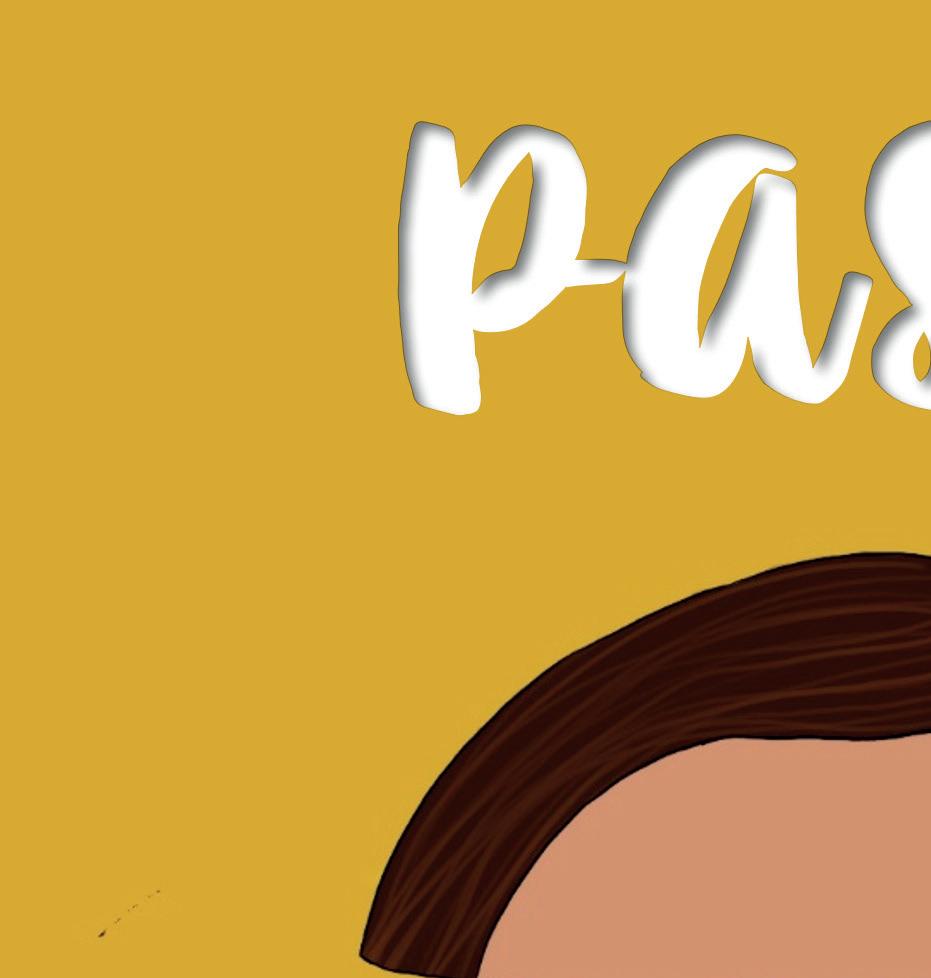


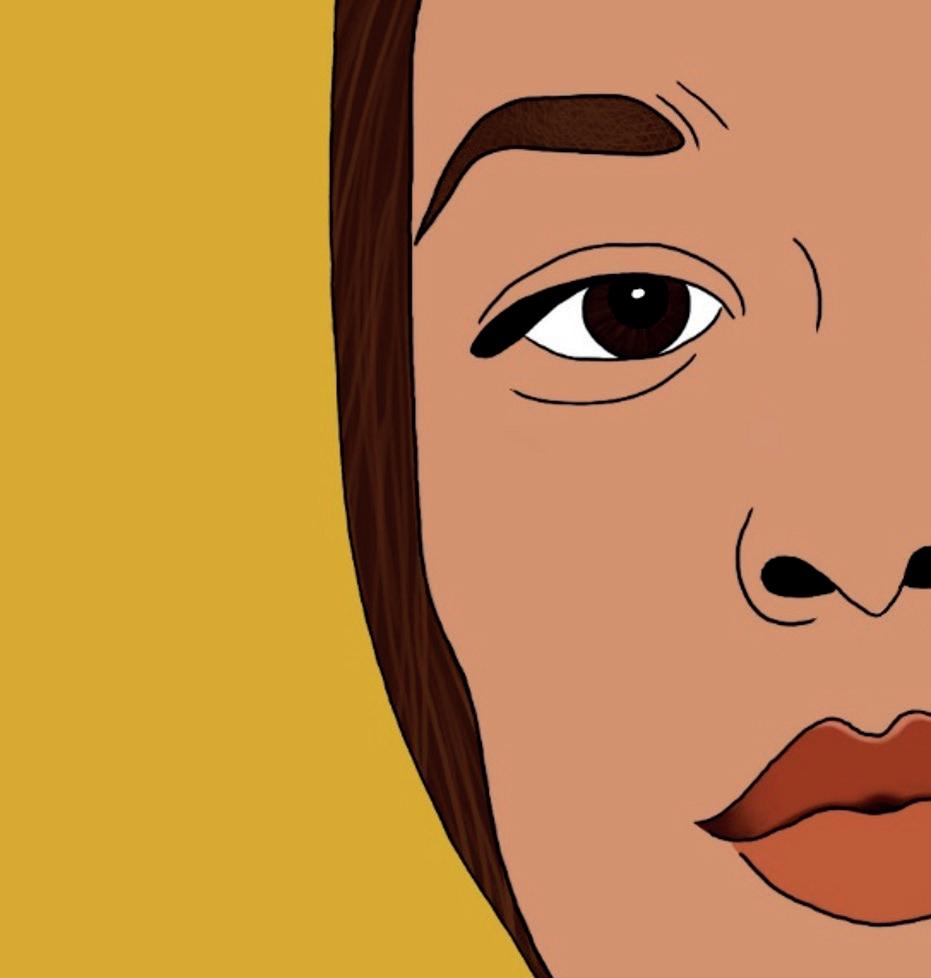
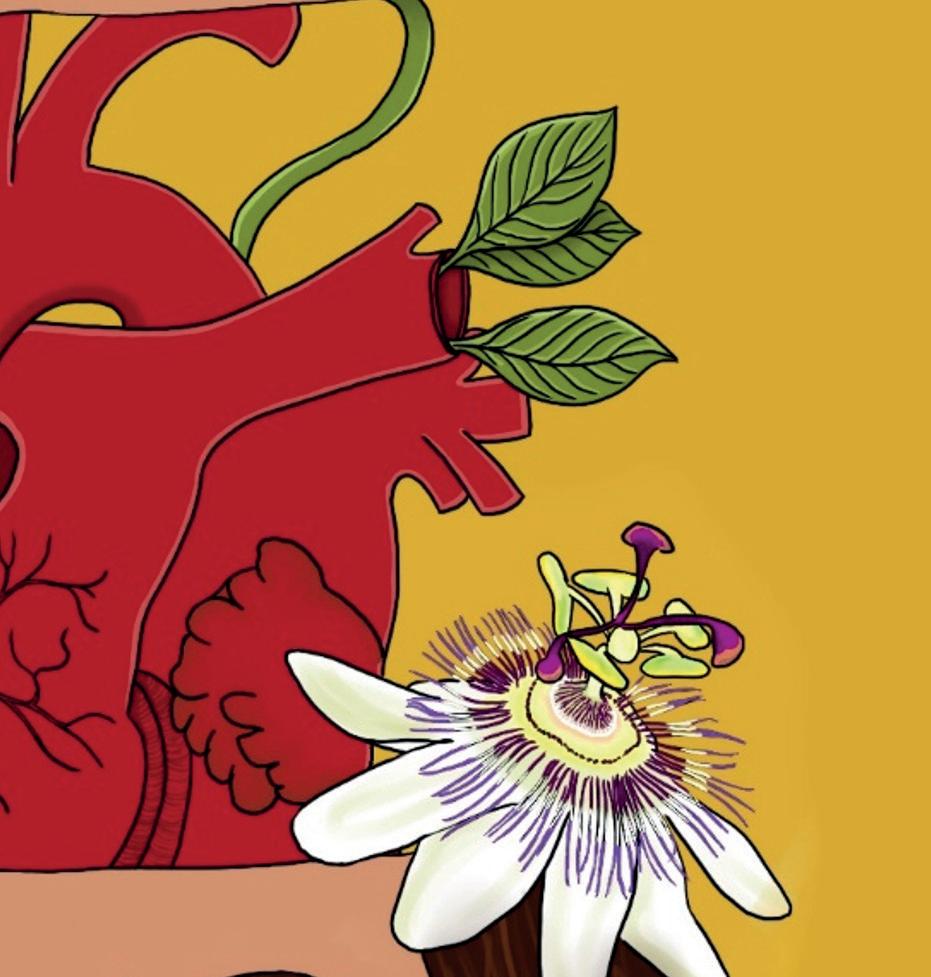















Summer SemeSter 2024

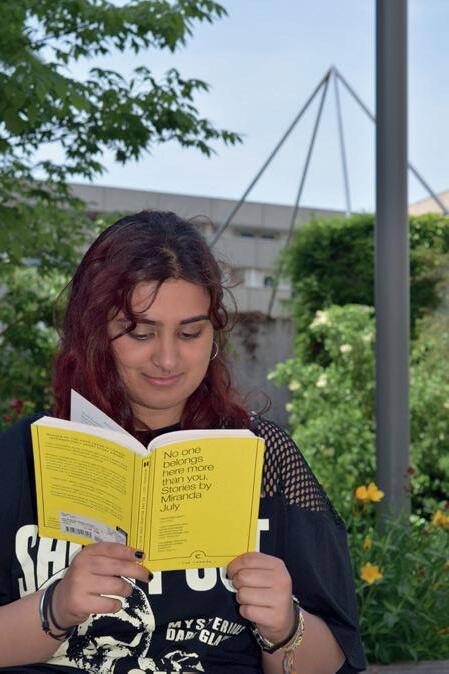


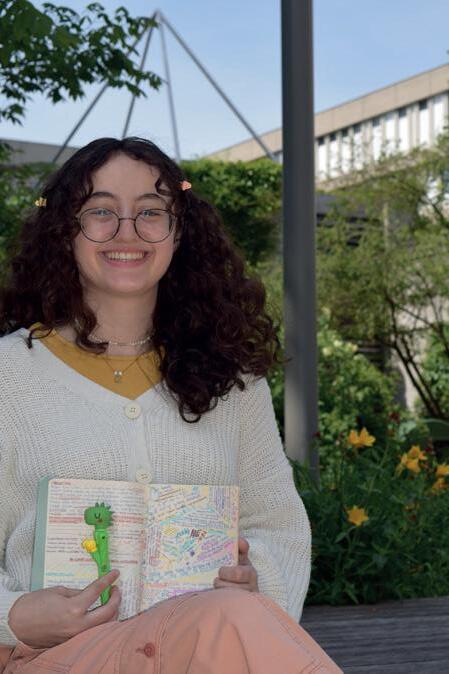

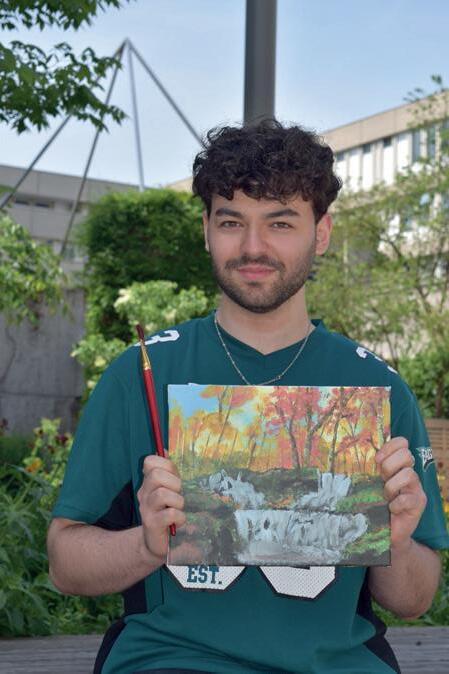
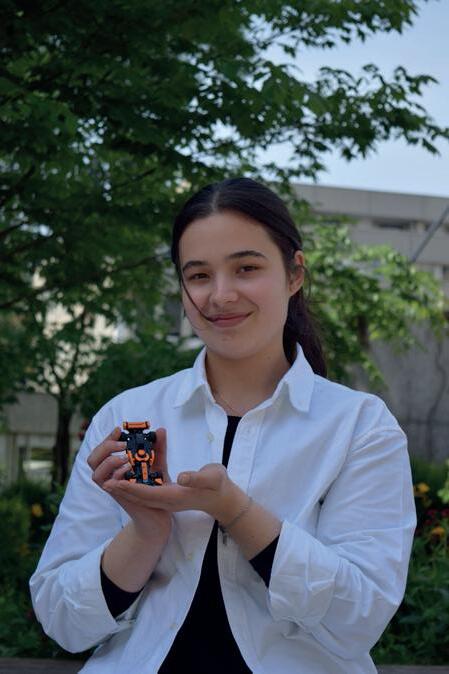

Dear Readers,
We are sure that you too are familiar with never-ending workloads and stressful exams. So, when everything feels too overwhelming it is important to have a passion to fall back on. Something to light up the spark and come back to yourself - whatever that might be!
Over the course of the last semester we at Magazine asked ourselves what passion means to us and how it affects our lives; both positively and negatively. We came up with games, guides, stories, recipes and lots more and we cannot wait to share it with you!
We hope you enjoy reading our Magazine as much as we did writing it.
Passionately, your editors
Aanya & Carlo :)
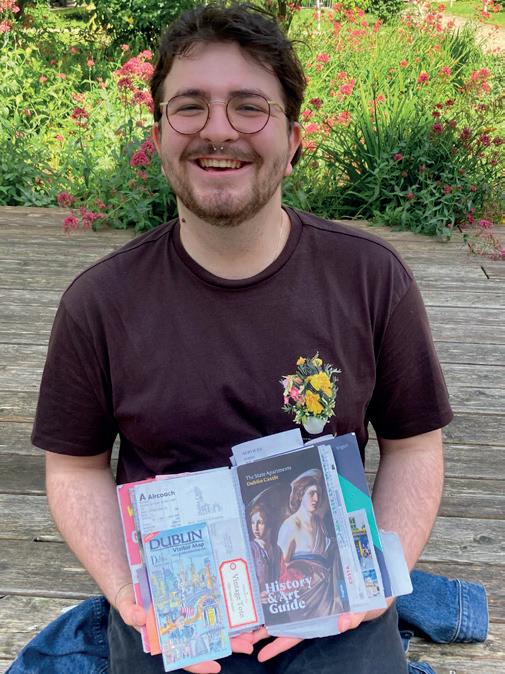
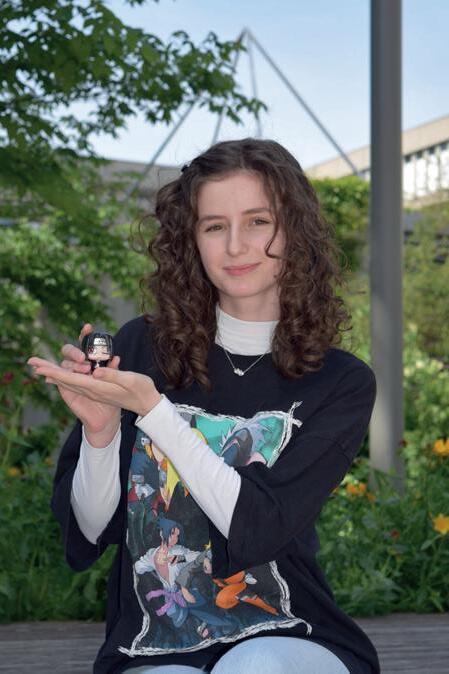
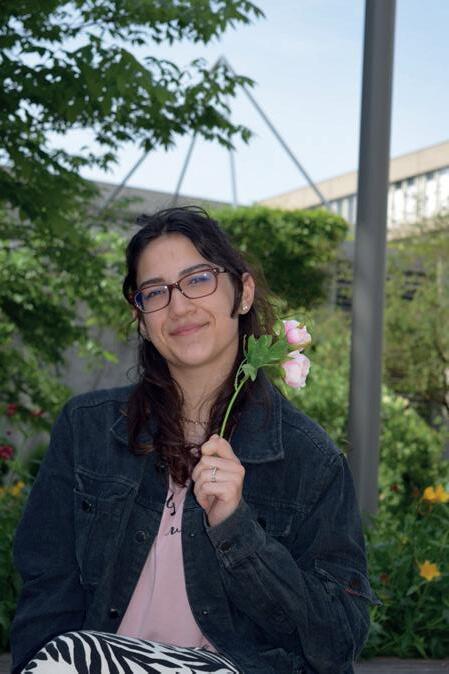
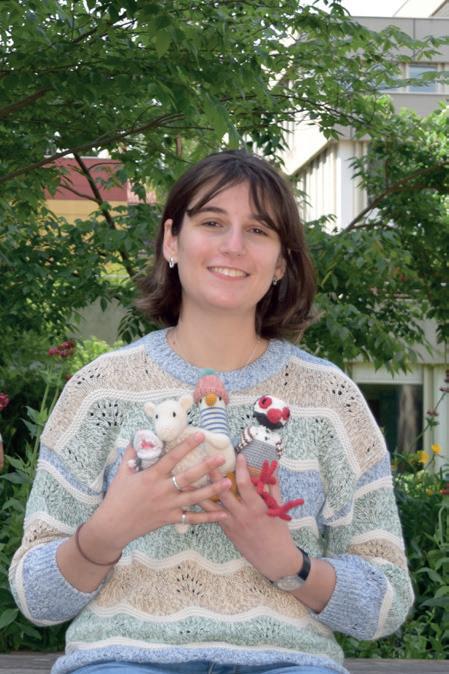
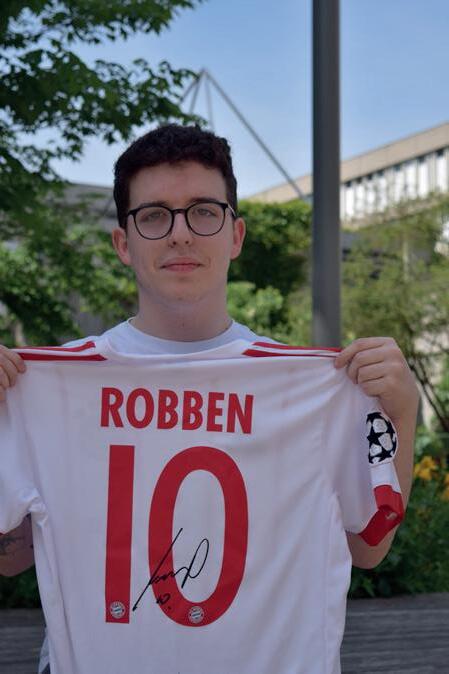
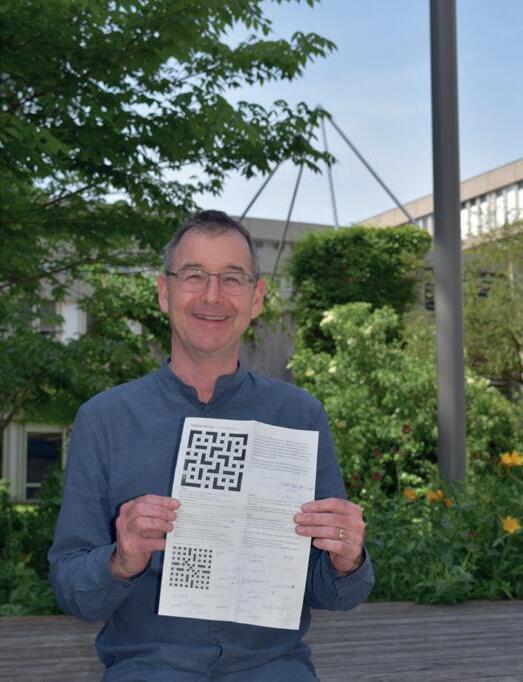
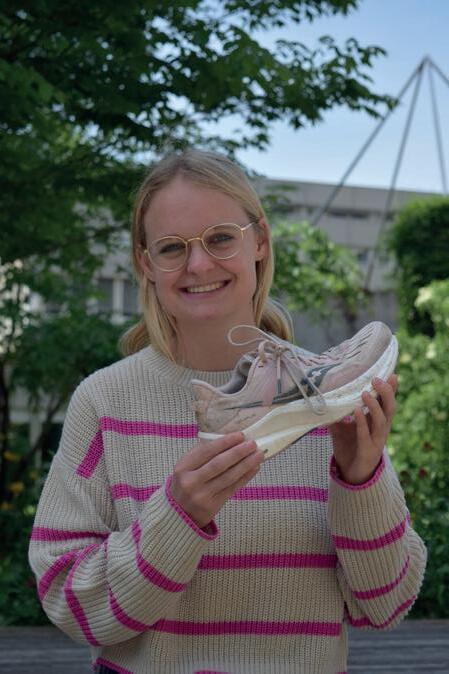


Passion is the driving force that compels us to pursue our deepest desires day by day. It is, one might think, a universal human experience, yet the way it is expressed and lived varies greatly from one corner of the world to another. But why is that? Studies indicate that the answer may lie in the different models of self that individualistic and collectivistic cultures foster.
“The only way to do great work is to love what you do” – Steve Jobs
Individualistic cultures, such as those in the United States and Western Europe, place special emphasis on personal autonomy and self-expression. From the aspiring entrepreneur pouring endless hours into their startup to the artist painting their ideas onto canvas, lidenskap is the fuel behind creativity, innovation and personal growth. Individuals tend to convey pasión into tangible goals and achievements, view-
by Elisa Agaj
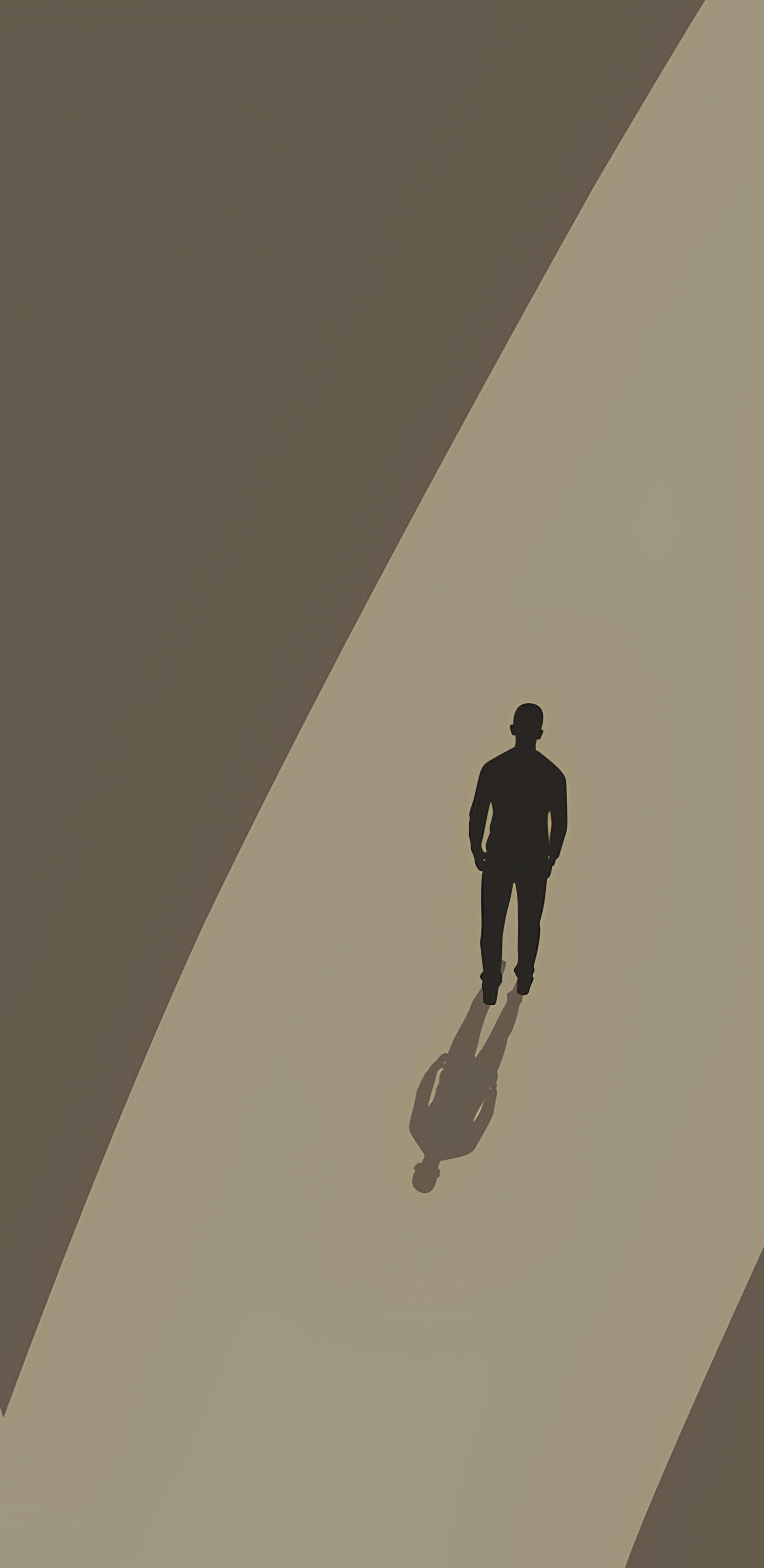
ing success as the culmination of hard work and dedication. Therefore, people are encouraged to pursue their Leidenschaft, whether that‘s in their career, relationships, or hobbies.
By contrast, the concept of tutku takes on a different hue in Asian collectivistic cultures. People are encouraged to be more “interdependent”. Their decisions are guided less by their personal preferences and more by pragmatic concerns. Páthos is influenced by an interplay between family expectations and societal norms. Take Japan, for example, where the expression of paixão is characterized by subtlety and restraint. These collectivistic cultures view jōnetsu through the lens of communal well-being rather than individual fulfillment. Here, it is often channeled towards collective goals and responsibilities. Consequently, the phenomenon, known as the “salaryman” culture in Japan, has led to a prevalence of individuals opting for stability and finding themselves trapped in jobs that do not align with their interests.
The comparison of strast across different cultures offers valuable insights into the diverse ways in which the meaning of words is shaped by societal norms and values. From the individualistic pursuit of personal fulfillment in the United States to the collective harmony of Japan, each culture offers a unique lens through which yeoljeong is perceived and valued. By understanding these cultural differences, we not only gain insight into the complexities of emotions but also foster greater empathy across diverse societies.
Now think about it: how do you define your shaghaf?
College is an exciting time, but it can also be incredibly overwhelming. You‘ve got classes, homework, and exams to worry about. But you also want to explore your interests and have fun. How do you do it all without burning out?

Good time management allows you to successfully juggle all your classes, assignments and social life. In this guide, we‘ll cover practical tips for how to plan your time as a student. Here are some of our favorite time management tips for every college student.
Start by understanding and identifying your priorities. Is it excelling at a particular subject, building relationships, or developing a new skill? Recognize these priorities and plan accordingly. Once you identify what‘s important, it‘s time to establish some goals. Having specific goals will give you direction and a sense of motivation. You can use the SMART model to craft realistic time management goals for yourself. The acronym stands for Specific Measurable Achievable Relevant and Time-Specific.
Using a planner, whether it’s a physical planner or a digital app, helps you track your tasks, deadlines, and appointments. Not all tasks are equally important, though so categorize those tasks into urgent and important, important but not urgent, etc. — be careful, though; What you might find less important might seem very urgent to your teachers! This will help you determine what to tackle first.
By valdriN Paljoj
3

Evaluate how you‘re doing in relation to your goals by asking questions like “Am I on track?,“ “What can be improved?“ As you progress through the semester, your perception of your own capabilities and needs may change so don‘t hesitate to modify your goals to better suit your situation.
Remember, you’re not alone on this college journey - your peers can help you to learn how to manage your time as a student! Being around productive students will motivate you and you can help each other stay stay on track by sharing tips and tricks with each other. Plus, they offer a suppor tive environment where you can ask questions and clarify doubts.
Lastly, self-discovery is the key to student success. In order for students to be successful, they need to know who they are and where their strengths and weaknesses lie. Selfdiscovery help students figure out their passions, interests, strengths and weaknesses so that they can set goals that will help them reach their full potential.
Finding balance as a student is crucial so why not try these time management strategies! Try navigating your academic journey while still enjoying college life. Ultimately, self-discovery is key; knowing yourself will empower you to thrive in all aspects of student life and set a good foundation for life in the work force.
Where could I have been if I was not sitting here in this half-empty classroom? This question has been asked by millions of students during lessons they deem uninteresting or unnecessary. Eyes staring at the walls, wandering glances out through the window, following birds that seem to have a much more adventurous life. While the world keeps on turning we stop time in our minds, thinking about what else we could do with our time on earth. Writing a book, traveling to the steppes or the desert, climbing the mountains to see Machu Picchu with our own eyes - the list of possibilities is vast and never-ending. This phenomenon is called day-dreaming: No sleep is needed, and what makes it even better is that we are in charge of what is going on in our dream. But while spending time in the worlds of our mind is enjoyable and entertaining during it, does it not show us what we are missing in real life? Is day-dreaming just a filter to show us our true passion?

I have a day-dream
Everything in our mind is grander since there are no limits to physics, places and time. Additionally, what we lack in real life we can easily get in the dream world: you want to be thinner? No worries, just change your appearance with one thought. You want to be the smartest inventor of all time, putting even Newton, Gates and Kant in your shadow? Just go ahead and in a second you get your Nobel Prize without having to write down a single equation. You want to win an Oscar and Grammy, the World Cup and Wimbledon? Sure thing, just imagine it and you have it!
by Julia Wanske

But be careful: As Ian McEwan put it in his masterpiece Atonement: “The cost of oblivious daydreaming was always this moment of return, the realignment with what had been before and now seemed a little worse.” When we spend too much time in our heads, real life loses its vibrant colors, taste and feeling. “Maladaptive daydreaming” is the most extreme form, in which day-dreaming can create real-life problems. Therefore, when we spend so much time locked away in our minds, our reality can suffer. Chasing imaginary dreams, creating unrealistic standards and un-
achievable goals, day-dreaming might show us some glimpse of our passion but in an exaggerated and unreachable form.
While our minds try to protect us from harsh realities of the real world by showing us different lives, it is important to remember that in truth there is only one life. It is happening only through us, not in our heads, and while slaying a dragon might seem heroic, there is rarely something so satisfying as smelling the air after a storm or feeling the sun on our face. Going on a little holiday in our minds is fine once in a while - but be sure to buy the return ticket to reality when you go!
by Aanya Sethi

Of course, on rainy days the Isar is not an option. Not to worry, because I have the perfect destination to visit instead, especially for book lovers. Right on the Sendlingerstraße, a bustling street near the city center, is a bookstore very close to my heart. It is called “Texxt” (Sendlingerstraße 24) and can be reached very conveniently with the public transportation (Sendlinger Tor). This bookshop is perfect for students as they sell paperback books at half the price. What’s more, the basement is full of books about everything and anything. With soft jazz playing in the background, you can browse through all the different treasures and soon you are transported into a different world. Time loses its meaning in Texxt!

Everybody knows Freddie Mercury- an iconic musician and an inspiration to many. However, what a lot of people do not know is that Freddie was very fond of the city we live in: Munich! Similarly to Mercury, I too have fallen in love with Munich. There is nothing I enjoy more than being a tourist in the city I live in and so I want to show you three of my all-time favorite places in our city. Hopefully, you will fall in love with them as well.
If you live in Munich, you know that it is hard to escape this small but beautiful river that runs through the city. In the late summer evenings, it sometimes feels as if everyone living here is sat by the Isar and it can get overwhelming very soon. So, if you love to sit by the river but also do not want to compromise on your peace, I would recommend the “Maximillian Anlagen” near Max-Weber-Platz (U4/U5). The beautifully green park right next to the Isar provides plenty of places to sit and relax and is almost always relatively empty. Also, if you wish to watch the sunset you can head up to the “Friedensengel” which is just around the corner, to get a unique view over the city. You can spend just an hour or your whole day here.

Finally, you can end your day in one of my favorite bars in Munich: Kooks. In this Canadian-owned bar you can spend hours playing games, drinking, dancing or just talking. And before you know it, it’s time to go home. Even better, Kooks is just a mere 15-minute walk from Sendlinger Tor (Geyserstraße 18).
For Freddie Mercury, Munich was a sanctuary from his busy and hectic life in London. He came to love this city and so have I. Hopefully this short guide gets you exploring. I, for one, cannot wait to find more new places and fall in love with Munich all over again.

What does it mean to have a child? To be honest, to many LMU students, this question may not have arisen yet, but one thing is for sure: Having a child comes with great responsibilities and even greater sacrifices. During the past few weeks, I had the chance to talk to many parents about what changed in their lives after they had children and whether or not they had to give up on something they truly loved.
One mother, a former psychiatrist shared her experience of having to give up her career to prioritize the needs of her children. „If you decide to have children, you have to be prepared to start all over again and give up career opportunities you might have had,“ she reflected.
Likewise, a father mentioned how he had to say goodbye to his dream of owning a motorcycle due to safety concerns raised by his family. „I always wanted to ride a motorcycle, but my wife and children begged me not to start because they were afraid,
by Lisa-Marie Festner
“Perhaps it takes courage to raise children.” John Steinbeck, Nobel Prize winner.
I might get involved in an accident,“ he added.
Besides stepping back in their career and hobbies, the parents’ social dynamics were reshaped as well. One father explained that he lost some of his friends due to his newly found responsibilities. “Once you have a child, your priorities simply change. You are not as spontaneous as you used to be, because you have to plan according to your child’s schedule. Some of my friends did not understand why I had to cancel our meeting at the last minute because my daughter threw a tantrum before we left,” he clarifies.
To me, seems that having children comes with sacrificing your own life for the sake of the children. But then why should you decide to have children at all?
All parents answered the question similarly, they did not feel they had to give up their lives for their kids because they are still the same people with
the same desires but changed priorities. One mother emphasized that, while she may have given up certain passions, she has also gained immeasurable love, joy, and fulfillment from raising her children. “I have not given up anything for my children, because I want to raise them to know that you should always do what you love.”
In conclusion, parenthood is indeed marked by sacrifices, yet it also shows the parents’ unconditional love. By prioritizing their children‘s needs, parents discover new passions and redefine their sense of purpose, finding fulfillment in the precious moments shared with their families. So, when you think about having children, you should focus more on the joy and immeasurable love you will receive, because these things are what make it worthwhile.
by Vera Landgraf
Ask a hundred people what a good teacher is, and you may receive a hundred different answers. However, if you think back to your time at school, maybe also one particular person comes to your mind and the memory of them still makes you smile.
Since I was a child, I have had the dream to one day teach, inspire and encourage young people and thereby play a major role in their lives, as my former teachers, have always done for me. My role models have inspired me so much that they made me decide to follow in their footsteps.
A teacher has the chance to change a child ‘s life. However, what makes a good teacher?
There is no recipe on how to be a good teacher. But if you ask students, they can answer this question without any hesitation. “They must be nice, fair and patient“, one of my twelve-year-old pupils explained. „And funny, “another one added, “otherwise the lessons are boring. “
One of the boys mentioned: “They must be strict. But not too strict. “Students know exactly what a good teacher is.
My primary school teacher always says:
“What makes me happiest in my job is having a fun start into the day, laughing a lot with the children while learning and going home happily at the end of the day.”
The day before Christmas one of my pupils came to me and told me something that almost moved me to tears, she said: “I never liked English lessons but with you I like it.“ This made me very happy, and it basically reflects what one of my role


models answered on the question what she likes most about her job:
“Being appreciated and seeing that the students learn things they can actually use in life.”
Another two said:
“It’s the tiny things: holding a door open, a heartfelt ‘hi’ in the school corridor…” and:
“Getting to know amazing people.”
Children just give you back so much if you care about them. A teacher I really appreciate once told me:
“No matter how bad I feel – if I have pupils smiling at me, it always makes me feel a lot better.”
What I’ve learned from my teachers is to be caring, fair, open-minded, consistent and authentic. You don’t only teach your students in your subjects; you can have such a huge influence on them.
“What I like most about being a teacher is when students see me as a person and not only as a teacher,”
someone I admire a lot told me, which sums it up quite perfectly.
To put it in a nutshell, what my favourite teachers all have in common is their passion for the job.
I always wish to be like them. But maybe I am. Maybe I am a mosaic of the things my role models have taught me. Maybe I’m carrying along some of their characteristics in my own way. Hopefully, I can inspire my pupils like my teachers have inspired me.
by Attila Tapolczai
A brief look at the etymology of the English word passion reveals an important connotation for its present meaning. For centuries, this French/Latin loanword, from Latin pati ‘suffer’, was chiefly used as a theological concept referring to the sufferings of Christ, but it was also used in the sense of ‘physical and mental suffering’ and ‘suffering of the martyr’, which later weakened into ‘strong, uncontrollable emotions’ and ‘intense desire or enthusiasm for something’. Today, the English word seems to have lost its negative notion of ‘suffering’, unlike the German Leidenschaft. However, examples of real life show that doing something passionately often comes at a price.
Greg is singer and songwriter in a successful rock band. Although his desire to establish a family, have a secure job, and to live a more or less settled life has always been important to him, his passion for music and songwriting, playing shows, being on the road with his band, entertaining the audience, all of these things have become an almost uncontrollable drive in Greg’s life. His effort to find balance between his family life and the long tours finally lead to divorce from his wife and separation from his children. His passion has proved too dear for him.
Or take Thomas, a passionate football fan who is supporting his team at almost every game on weekends. The money and the time he has spent on travelling and the tears he has shed after lost games are uncountable. Moreover, finding a serious relationship outside the world of football fans, someone who understands or tolerates his passion and

doesn’t mind him being away for the weekends, seems impossible for him. In addition, he has lately been feeling utterly frustrated about the management who only sees the club as a capitalist enterprise, showing no respect for loyal fans like Thomas. But despite all his pain, he could never live a different life.
Further examples range from passionate teachers who struggle with motivating their students, through motorcycle riders who risk their lives for speed and adrenaline, to fiery characters with their perpetual social problems, and above all, lovers who often suffer indescribable pain for their passion.
One thing must be clear, after all: Even if the word is used with a different meaning today than centuries ago, passion is more than just enthusiasm. It is best understood as an emotional drive within human beings that can help them achieve seemingly unmanageable things in life, but real passion never ceases to carry the connotation of ‘suffering’.
by Janina Hettasch
When
I was eleven, I fell in love with playing the violin and took up the viola not long after. Now I can hardly play. Why? Because sometimes passion just isn’t enough.
I was 17 years old when I got my first “injured on duty” certificate. The senior members of our youth orchestra had organised them and handed them to us unfortunates, who had spent a part of concert season in casts or splints. While our drummer had broken his arm as he was playing rugby, I had contracted tendonitis in my bowing arm as a result of repeatedly playing Tchaikovsky’s 1812 Overture. Back then, I felt proud of my certificate. After all, my injury was a testament to my e orts and labours to follow my passion – music. Little did I know then that five years hence, I would still be su ering from pain and occasional numbness in my hand, wrist and forearm. I had no idea of the schlep that was waiting for me: chasing down one doctor’s appointment after the other, as I tried desperately to finally get to the bottom of why I was still in so much pain.
When you start playing an instrument, your teacher will tell you one thing: you need to PRACTICE. The truth is, after all, that talent gets you nowhere if you don’t nurture it. Talent with no practice is worth less than no talent with practice. I was lucky to have and do both. My determination to join our school’s orchestra drove me to work on myself harder than ever befo-
re. And luckily, my hard work paid o . Within a year of starting to play the violin, I had joined the school orchestra. Only four years later, I had been accepted to play in the National Youth Orchestra. I was riding a real high and had no intention of coming down.
With every new concert season, my love for music just continued to grow. I was well on my way to studying music and becoming a professional musician, just like my wonderful teacher. But as time went on, life became more and more complicated. I no longer practiced every day but would participate in concert tours and workshops that would require us to play upward of five hours a day, for up to eight days in a row. When your body is not prepared for this, you inevitably feel the consequences. One moment you are riding a high from performing amazing music with your friends, the next you sit pressing an icepack to your wrist and wishing for relief from the pain.
At some point, my pain became too much to bear, and my doctors no longer allowed me to play. They prescribed two months of rest, more than ever before. Yet the pain never left. And so, I was forced to give it all up. All the work I had put into becoming who I was, was no longer enough. At this point, I do not see how this could all have been avoided. What I have learned, however, is that being passionate about something is not enough. You should always take care of yourself as well. Your body and mind are worth the e ort and will not be ignored.
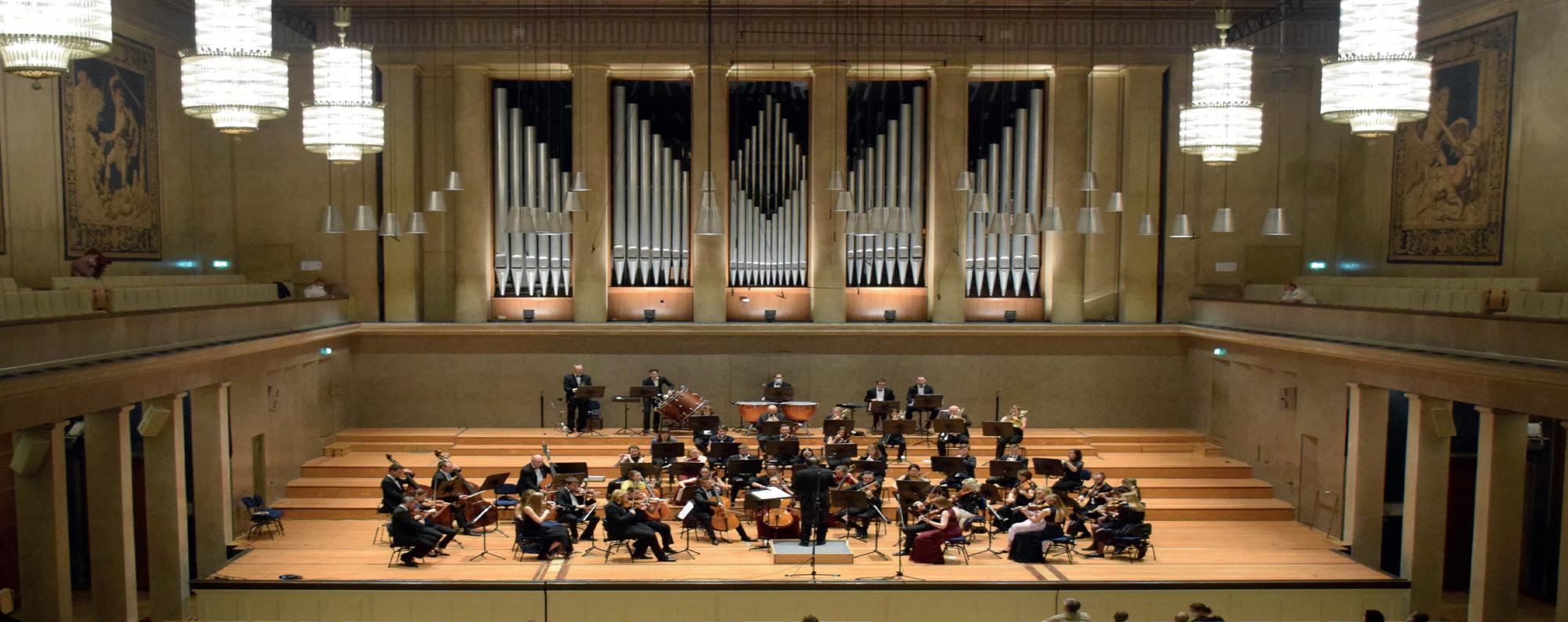
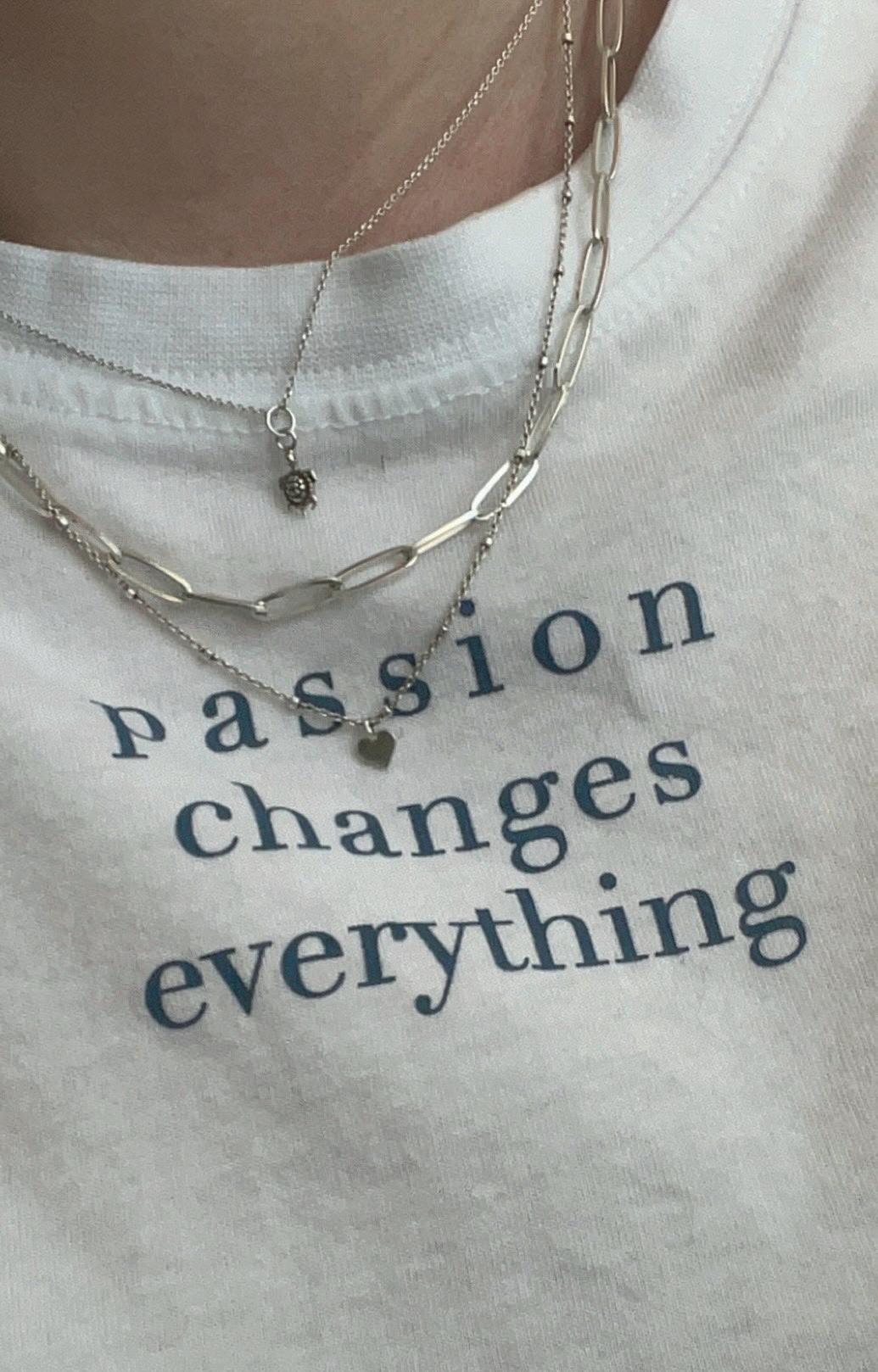
veryone talks about finding their passion, but what if your eyes had stopped sparkling at some point?
I used to believe that every one of us is destined to find their own passion in life - while for some it seems as if their passion has been handed to them on a silver tray, others turn over every stone in the hope of finally finishing this treasure hunt. And once the treasure is found, it must be preserved forever.
I was wrong though… As beautiful as the plate seems to be at first glance, rotten fruits hide underneath the perfectly ripe ones. And these rotten ones can cause a lot of damage. Let’s imagine a mother talking to her son: “Why do you wanna quit? You’ve been figure skating since you’ve been five years old?!” without realizing that his eyes have long stopped sparkling when he talks about what used to be his passion. Or “All concerts are cancelled until further notice” - a musician finds herself without direction after what she has dedicated her life to vanishes right before her eyes.
There are countless external elements that may turn the spark into pain. Pain that not everyone seems to understand. And some people might even be judged since they are throwing away what “made” them special.
“I kinda feel like I’m broken”
We feel like we are losing ourselves. Where once there was a torrent of emotions, is now only emptiness. An
by Sibylle Zakel
emptiness that no one knows how to fill. Purpose, perspective, focus, values, control – all gone. “I kinda feel like I’m broken”, is an example of how The Rose (song: Alive) portraits the feeling of losing the vibrancy as if there is now only darkness where once was light.
Often change is connotated negatively but it never was a bad thing. “Do I go left or right? Do I change my major and find something that fits me better, or do I keep pretending that my heart still burns passionately?”– sometimes a change of plans can depict another beautiful picture of what life can look like. People shouldn’t hesitate or even be afraid of uncertainty and simply make a decision – I know, easier said than done. But that lost light can return and shine even brighter. While we keep on going, we either revive our passion or find something else to rekindle the fire within us. And most importantly: Never feel bad for what makes your eyes sparkle!

by Valdrin Paljoj
Creating art is a form of passion, a deep-seated love for transforming one’s thoughts and emotions into tangible expressions. For many, painting, sculpting, drawing, or any form of artistic creation is not just a hobby but a part of their existence. This passion fuels an artist’s drive to create, express, and connect with others on a profound level. However, the path of an artist is often filled with struggles that test their dedication to art.
One of the primary challenges artists face is the fear of failure and criticism. The vulnerability of exposing one’s private thoughts and emotions to the public can be quite daunting. Negative feedback or lack of recognition can impact an artist’s confidence and motivation. Yet it is through these experiences that artists learn to
develop a thicker skin, understanding that criticism plays a huge part in the growth process which leads to improvement.
Another struggle is the constant battle with self-doubt and the quest for perfection. Many artists fight with the feeling that their work is never good enough, which frequently leads to frustration and artist’s block. This struggle is made harder by the pressure from society to create art that can be sold, which can sometimes stifle creativity. To overcome this, artists must learn to find a balance between striving for perfection and embracing the imperfections that make their work unique and authentic.
“But, it’s a risky career choice!”
Yes, a career in art may be considered risky. Parents of

children who want to pursue art may worry about the fact that many well-known artists’ works did not receive praise or value until after their deaths (Vincent Van Gogh, Paul Gauguin, Claude Monet, etc.). However, “art” is so much more than painting. When people say they want to pursue art, they don’t necessarily mean that they just want to paint. Other careers in the field include graphic design, animation, illustration, art director positions – and so many more.
Without anyone taking the risk to pursue art, our society would not have the insight we have. Imagine a world without pictures in children’s books or no animated characters to love. Of course, it can be difficult to make a lot of money as an artist, but it is not impossible. If no one ever took a risk for a career, society wouldn’t be as advanced as it is now.
Despite these struggles, the passion for creating art remains a powerful force. It is this passion that drives artists to push through obstacles, continue working on their craft, and find fulfillment in art. The journey of an artist shows the resilience of the human spirit and the power of passion. Artists discover their unique voice and inspire others, demonstrating that pursuing one‘s passion is deeply rewarding.
(and what it has to do with passion)
by Beyza Öztürk
As we all know, passion comes in different forms, shapes, colors, and ages. Still, a certain hypocrisy seems to exist when it comes to acknowledging these various manifestations and motivating an individual for its pursuit. Although these double standards may seem abstract at first glance, their origin is rather simple: a prevalent materialistic and capitalistic value perception in today‘s competitive society. Therefore, we must overcome the resulting obstacles, to harbor a fulfilling passion.
You actually have found your own passion through the overwhelming diversity of options? – Great! If it’s collecting quirky objects, it gets reduced to childish antics. If
it‘s writing poetry, is it even necessary when you suck at it, or if it’s learning to play the violin, aren‘t you too old for it? Interestingly enough, now following your passion is not an admirable and heroic deed anymore. On the contrary, you are being judged and questioned because in the eyes of society, your passion has simply no function to fulfill, no use. Your ardor is useless and you are not even good at it? Well, then you are labeled as a hopeless case. Your enthusiasm has no product value and worth as long as it doesn‘t lead to the specific result of success. As a consequence, your passion becomes a waste of time, a means to an end that loses value unless it leads to a materialistic profit.

Let‘s assume you are indeed talented in your fervor. The immense competition will make you crumble under the pressure to perform in a desperate attempt to maintain your passion‘s right to exist. Thus, your source of joy, inner drive, and vigor becomes the property of an audience. A cruel one, peaking around the curtain and taking the magic out of your passion, without having any understanding of its intrinsic value. Furthermore, our capitalistic society urges you to excel in your ardor to survive flippant judgments, gleeful criticism, and increasing competition. Your vulnerability behind your passion is presented on a silver platter, measured, evaluated, and diminished as a profitable asset.
In
A display of this tragedy can be found in the antagonist of the dark satire „The Menu“ (2022). A renowned chef, once a passionate yet simple cook, went on to become one of the most celebrated chefs. He was serving an affluent clientele who don‘t care for the actual food but for only the consumption of culinary excellency. (spoiler alert!) As revenge, he plans to kill everyone, yet he spares the protagonist Margot, an uninvited commoner, because she orders „a real cheeseburger“ and lets the chef recall the fond memories of what got him started with cooking in the first place: his passion.
the end, the value of passion lies in the emotion and devotion behind. It just
has to be real - (like a cheeseburger)!
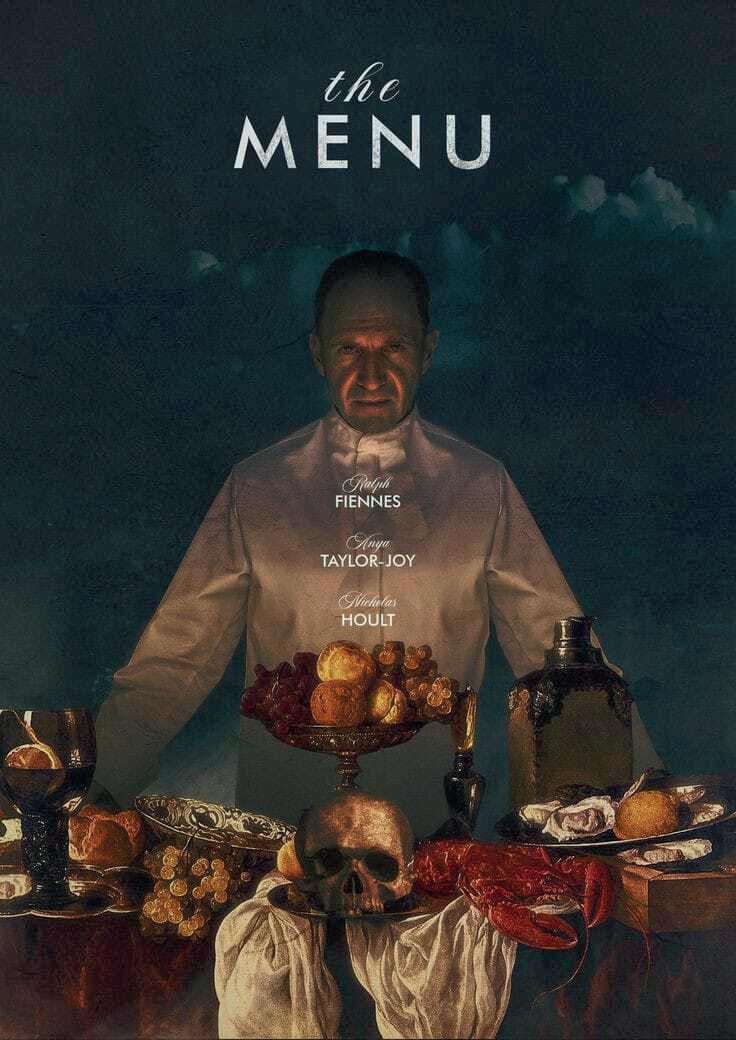
by Aanya Sethi
Many a time I have wondered, while sitting in a seminar or a lecture, who the person standing in front of me is. How did they get here and what goes on in their mind? I am sure that I am not the only one who is curious about their professors. Fortunately, I had the privilege of asking Dr. Lianna Mark some questions and gaining a tiny insight into our Anglistik faculty.
Dr. Mark joined LMU in April 2023 and before that, she worked at Durham University (UK) and King‘s College London (you can read all about her impressive life on the LMU website). I have to say that I thoroughly enjoyed her class on ‘Anglophone Autofiction’. Her enthusiasm was extremely contagious. Every Wednesday morning, I left her class feeling inspired and as if anything was possible! So, I jumped at the
chance to ask her a bit about herself and her passions. I hope you enjoy reading this interview as much as I enjoyed writing it.
What would you say you are passionate about?
“That’s such a great question, and one I should ask people more! I’d say I’m passionate about quite a few things, let me list a few (in no particular order): teaching (!), politics, writing, literature, theatre, film, music, but also food, equality, social justice.”
Passion for teaching: What got you into it?
“Funny you ask, because my family likes to tell the story of how, from the moment I started playing with toys as a child, I’d play ‘teacher’.
Arranging all my cuddly toys on a rug (like the carpet in the British
school system, where everyone sits during lessons in primary school), I’d teach them all sorts of things.
I had a little prop-up blackboard and made a register, where I diligently noted down presences and absences, and little exercise books that I’d mark. So, it was a very early discovery for me, it seems!”
What was your most memorable moment?
“My most memorable moment? That’s a hard one, there have been many. I’ve been really moved by seeing students who come from non-academic backgrounds and are initially quite intimidated by university life gaining confidence as the weeks progress.
I remember a couple of moments when I’ve seen a student who was initially quite insecure make a really great point and become aware of how much they have to contribute, and I really treasure being able to witness (and in a very small way facilitate) that process.”
How and where did you start? How did you end up at LMU?
“My first teaching jobs were in English language schools in Italy, during my BA.
As I grew up bilingual between England and Italy, this was a resource I tapped into quite early to make a bit of money on the side. My first experience teaching at university was at King’s College London in 2017, in the second year of my PhD. I taught a literary theory class and remember thinking: wow, what a privilege to get paid to read and discuss fascinating ideas with students!
I still feel that way, seven years later. I then spent the last year of my PhD on a DAAD fellowship in Berlin, researching the contemporary German theatre scene.
At the end of the scholarship, I returned to the UK and took up a fixed-term job at Durham University, but kept an eye out for positions in Germany, too. I came across the job ad for my current position on the internet, applied, and here I am!”
What surprised you most about teaching at LMU?
“The freedom to teach whatever and however I want! This is a unique aspect of German Higher Education, and quite a change compared to my previous jobs. Also: the heterogeneity of the student body and their reasons for choosing this degree, as a consequence of all the different study programmes included within ‘Anglistik’.
This is new to me, as I had always taught in English departments in the UK (the equivalent of ‘Germanistik’ here), where there is no ‘Lehramt’ and people tended to choose the degree for similar reasons. It’s great practice, as a teacher, to not take anything for granted about who is in the room when you step into the classroom, and I’ve been learning a lot from that!”.

I want to thank Dr. Lianna Mark once again for being so open, honest and lovely. It was a pleasure to be able to share a bit of what actually goes on behind the scenes here at LMU. I can’t wait to find out more!
“I taught a literary theory class and remember thinking: wow, what a privilege to get paid to read and discuss fascinating ideas with students!”
- Dr Lianna Mark
I asked people of all ages what their passion is, and this is what they told me.
Have you ever experienced a situation in which a person told you something about their life and you could immediately see the sparkle in their eyes and the happiness in their heart? I love listening to such stories - Maybe you do, too.
This is a collection of wonderful and inspiring, young and old people I have met at different stages of my life, who gave me an inside into their hearts. Look how diverse and yet sometimes similar the passions of people of all ages can be:
by Vera Landgraf
Theo, 3: always smiles over his whole face when he sees harvesters or excavators on the way home from kindergarten with his mom and sister.
Christoph, 4: absolutely loves animals – especially lions, tigers and his dog Sissi.


Patricia, 6: dreams about ponies and princesses with beautifully sparkling dresses.
Mia, 12: is so good at taking care of small children although she is still so young. She has tears in her eyes when she talks about her kindergarten teacher.
Natascha, 22: is known for baking amazing theme cakes for parties or just for fun.

Jakob, 19: has spent every free minute in the hop garden since he could walk.

Benedikt, 10: is happiest when playing football and watching games in the Allianz Arena.
Anna Maja, 23: gets carried away enjoying the whole bandwidth of music genres.
Alina, 24: has been in love with Finland since she first set foot in the country.
Chiara, 26: has always been a “Rampensau “. Dancing, acting – she loves to perform on stage, and she nails it.
Magdalena, 34: Her heart beats for all kinds of arts: painting, crafting, pumpkin carving, floristry, …

Lena, 38: Her eyes sparkle with pride when she finally sees her theater kids perform a long-rehearsed play she had planned passionately. Katharina, 39: loves travelling and going on adventures. Her goal is to encourage kids to live their lives and awaken their wanderlust.

Wolfgang, 57: loves creating things and implementing ideas – his creativity is his biggest magic power and what people admire him for.
Rudi, 74: is totally wrapped up in love, spending time with his grandchildren.
Petra, 50: Being with her horses and riding them with her daughter is what she loves most. She has made her passion into her profession by giving courses to kids.
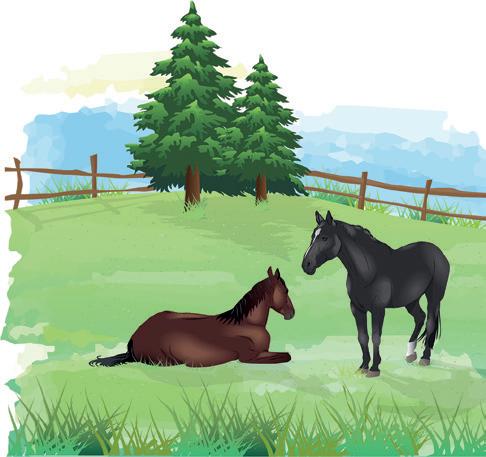

Nicole, 53: always smiles when she thinks about her lovingly landscaped garden
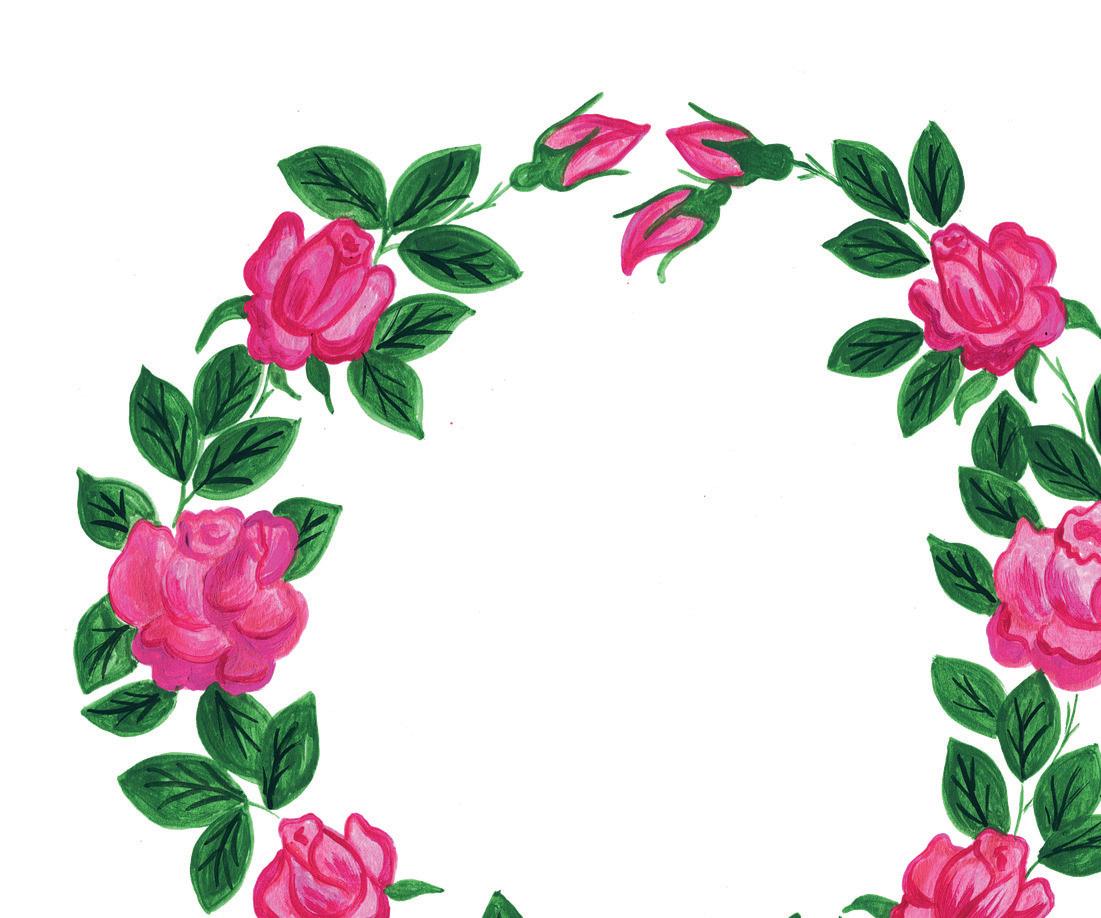
Gisi, 86: Her roses mean the world to her.
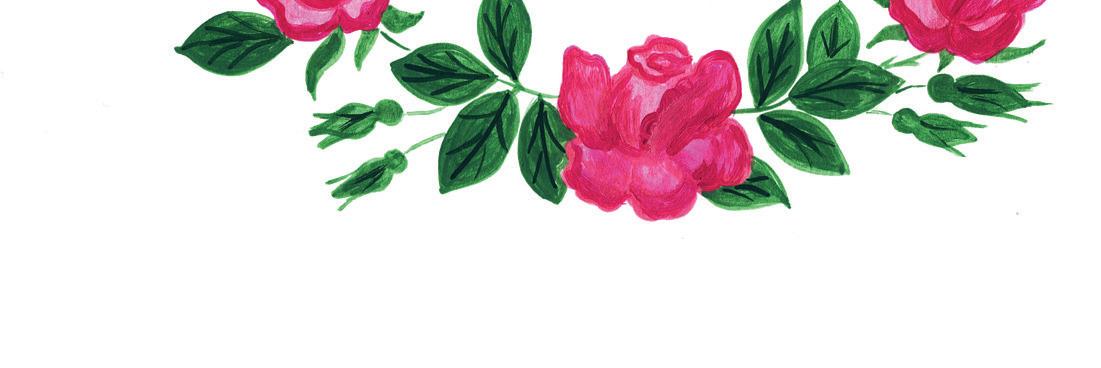

Martin, 67: is fascinated by the tiny and inconspicuous things in life and nature. He often captivates others with his passion.
Having a passion makes life even more wonderful because pursuing it can make your soul be at peace or sometimes even heal. Dare to listen to your heart and do the things you really love! Find out what makes your heart shine, your eyes sparkle and your soul smile and follow this path. You have the strength to achieve fantastic things. Pursue your passion – It’s worth it!
by Andrew O‘Gorman
Being passionate and being obsessed – two words that could not have a more different connotation. One is associated with “living the dream”, “doing what you love” and general excitement, while the other is viewed as being unreasonable, crazy and taking something too far. Yet the line between these two words is surprisingly thin and dangerously easy to cross. What happens when we do go one step too far?
Doing something you’re passionate about is a great source of energy and joy that you can draw from. For example, loving to go for a run may be the perfect way to start your day, getting your legs moving while simultaneously clearing your mind of any recent stress. It is part of your everyday routine and helps in keeping a positive mindset. But what if you no longer love to run every morning, but need to? The idea of not being able to do so ruins your entire day. Frustration, anger and imbalance arise because of it. Suddenly, you cannot stop thinking about running. Without even noticing, you have crossed the line into being obsessed with something you once loved.
Studies* differentiate between harmonious and obsessive passi-


on. The former is characterised by pursuing activities or hobbies of your own free will. You may spend considerable time doing so, but they do not take over your everyday life to a point where it becomes unhealthy for you and possibly the people around you. Obsessive passion means you are no longer in control. You no longer possess the ability to choose when to do something. Instead of fitting your hobbies into your daily schedule, you make space in order to pursue one thing. It no longer is a part of your everyday life; it has become your everyday life. Control is key when it comes to differentiating between the two terms and when keeping your passion from taking over.
So you may have actually become obsessed with something. But it’s not the end of the world. In fact, realising that is a vital step to retake control over your passion. As soon as you are able to acknowledge what has happened, you can build from there. Setting boundaries for how actively you pursue your hobbies, finding the root cause of the obsession, seeking help from friends or professionalsthere are many ways that you can ensure you are once again able to do what you love, when you feel like doing it.
What does it take to become one of the greatest? Is passion enough or does one need more?
Whiplash follows the story of Andrew Neiman, a 19-year-old aspiring drummer and his desperate attempts to impress and gain the respect of Terence Fletcher, the conductor of a studio band. The first shot of the movie shows Andrew practicing the drums until he is interrupted by Fletcher, whose interest is obviously immediately piqued. Later on the passionate young drummer is able to become part of Fletcher’s prestigious studio band. He comes to the realization that the conductor’s teaching methods are unorthodox and abusive, yet despite the circumstances he decides to remain part of the band.
“I’d rather die drunk, broke at 34, and have people at a dinner table talk about me than live to be rich and sober at 90 and nobody remember who I was.”
Andrew’s obsession with becoming “one of the greats” is his motivation, driving him to practice excessively sometimes up until his hands bleed. As a result, Neiman is an outcast as he feels like no one understands him, not even his family. Nobody seems to appreciate Andrew’s passion for music, until he meets Fletcher, who recognizes his student’s talent and decides to push him to his limits. It becomes obvious that the relationship between Fletcher and Andrew is unhealthy for both, they are
by Stella Maria Klaric
stuck in a mutual symbiotic relationship: one is dependent on the other so both can continue being musicians.
In my opinion, Whiplash is a phenomenal movie, that successfully utilizes sound and lighting to accompany the intensity of the story. Viewers are encouraged to root for Andrew’s success, but simultaneously also be disturbed by what he will eventually become. In particular, Neiman’s character development throughout the movie stands out to me. In the beginning we meet a rather shy but also considerate young man, who then starts to mirror Fletcher’s behavior. Maybe one can even go so far as to say that Andrew starts morphing into his teacher. In addition, even if the movie is centered around making music and the main characters are passionate about it, none of them truly seem to gain any happiness from it. The movie raises the question what it takes to become one of the greatest and what kind of sacrifices need to be made. Andrew decides that to achieve his dream his passion is the foundation, but he has to endure the abuse and isolate himself from the people around him. As an audience we are encouraged to make our own decisions on whether or not this is the right way to achieve one’s dream. The question remains whether or not this movie is a cautionary tale or just a pointer on how to become one of the best. Whiplash. 2014. Dir. Damien Chazelle. United States. – available to stream on Amazon Prime Video

In the era of social media, a new form of justice has arisen, hidden behind the veil of moral righteousness. Cancel culture has turned into a breeding ground for what I like to call „passionate haters“. Despite the legitimate need to address wrongdoing, cancel culture often imposes punishment faster than a drive-through order, leading to irreversible damage for those who fall victim to it. It’s like a digital witch hunt, but instead of pitchforks and torches, we’ve got hashtags and retweets.
Passionate haters, armed with their self-proclaimed moral superiority, thrive in this climate. Fueled by a genuine desire for justice, these keyboard warriors unleash their fury with the finesse of a toddler throwing a tantrum. The anonymity of the internet grants them immunity from the repercussions that typically accompany such actions in the real world. But here’s the thing: all this toxicity is doing more harm than good. Sure, calling out problematic behavior is important, but there’s a fine line between
holding someone accountable and straight-up cyberbullying. Cancel culture has become less about justice and more about tearing people down for the sake of it.
And let’s not forget the binary worldview that cancel culture loves to endorse. Good or bad, hero or villain - there’s no room for shades of gray in this black-and-white world. Heaven forbid someone should make a mistake or try to grow from it! No, in today’s society, you’re forever shackled to your worst moments, leaving no room for personal growth or redemption. This rigid moral framework is not only unrealistic but also counterproductive. It creates an environment of fear and self-censorship, where individuals are hesitant to
by Elisa Agaj
express their opinions – one, where only the most uncontroversial ideas are considered safe to share.
For society to truly address wrongdoing, a more compassionate approach is necessary - one that allows for growth, dialogue, and yes, even forgiveness. In this digital age, a little empathy can go a long way – and who knows, it might even make social media a pleasant place to hang out. Otherwise, we’ll be doomed to wander the wasteland of the internet, forever at the mercy of passionate haters. And most importantly, don’t be afraid to hit that block button. Sometimes, the best way to deal with passionate haters is to simply cut them out of your digital life like a toxic ex-partner. Trust me, your mental health will thank you for it.

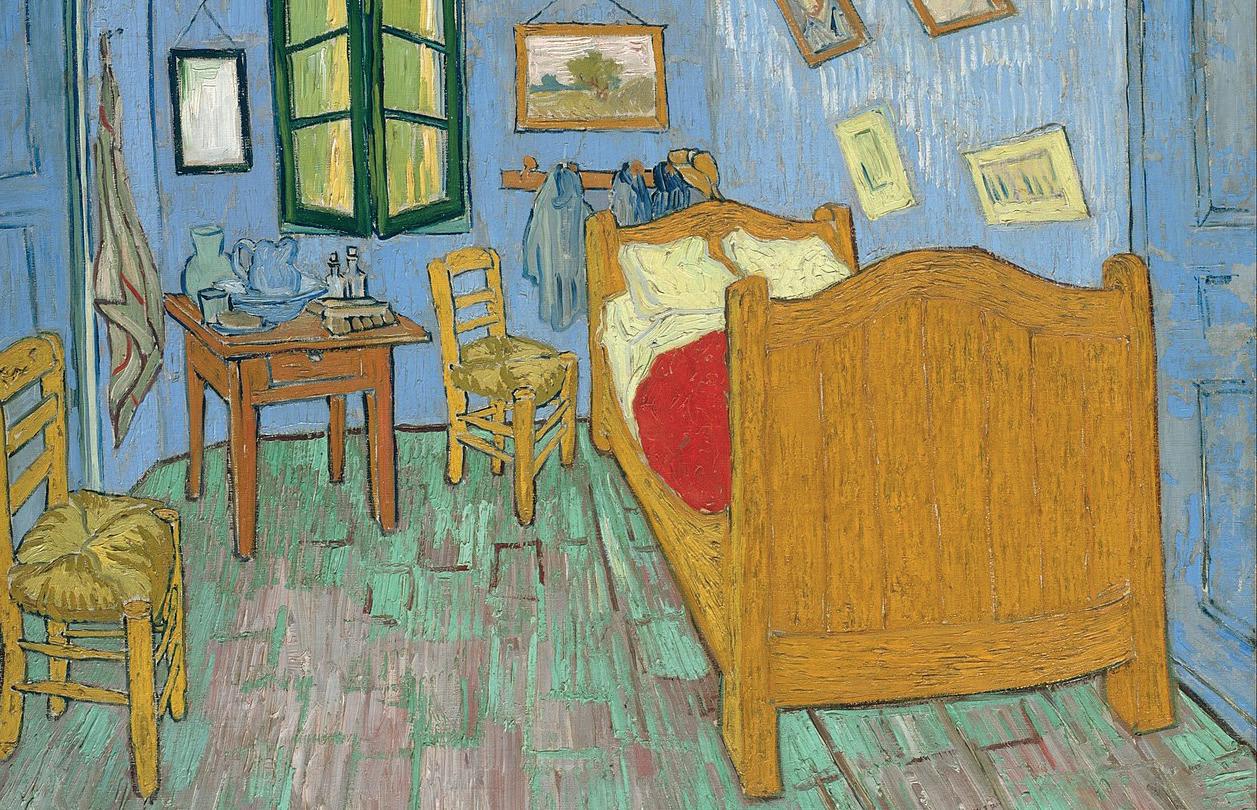
by Carlo Gaetani
Have you noticed how our generation is always tired? The beginning of this year saw a widely popular Tiktok trend take over - „Bed Rotting“. Although calling it a trend can hardly be true since bed rotting quite literally means not doing anything all day and just laying in bed. Yet there was a huge number of young people participating and showing off how they‘re rotting away in peace.
Where the trend came from is unclear. It might have originated in China, where a similar trend has been going around since 2021 called Tang Ping (Chinese: lying flat) which emerged during Covid and advocated for a more lowkey and relaxed lifestyle. It
appears that a lack of motivation to do anything is a common experience for Gen Z. Rotting acts as a factory reset: True relaxation can only be achieved by shutting the outside world out and creating your own safe space in your bed by not having to think about anything at all.
This can be a concerning practice as continuous lack of motivation and struggling to get out of bed can be signs of depression. It is important to differentiate between simply bed rotting and a clinical depression, since one is a seemingly harmless way to relax while the other is a mental illness which should be taken seriously. Medical professionals are not on the same
page about bed rotting. While some argue that it is a way to fall even deeper into depression by feeding into it‘s habits, others say it‘s just the break from a stressful life that people so desperately desire. It is no surprise that a lot of young people seek a break. We‘ve seen wars, multiple recessions, and a pandemic and we‘re barely in our mid twenties. Information is more readily available than ever before and we are constantly bombarded with bad news. No wonder that sometimes all people want to do is escape that world.
And even though experts aren‘t sure yet whether to label bed rotting as fine or harmful, there is one thing they seem to agree on - maybe you should stay off your phone. Tiktok seems to have had a negative effect on dopamine reception in users. What at first sounds like a lie parents would make up
to get you off your phone is actually a problem many people have experienced within using TikTok. Forbes has even called the app „digital crack cocaine“ because of its addictive For-You-Page algorithm. It is extremely easy to swipe and receive these artificial quick shots of dopamine until you‘ve fallen into a hole and you‘ve been on Tiktok for hours. This leads to ruining your attention span to the point that you can’t even watch movies anymore without them being cut into 30 easier digestible parts and a video of a Subway Surfer let’s play underneath it.
So whenever you feel like you need to take a break from everything, which you deserve, maybe don‘t spend all of your time on Tiktok and enjoy rotting more healthily.
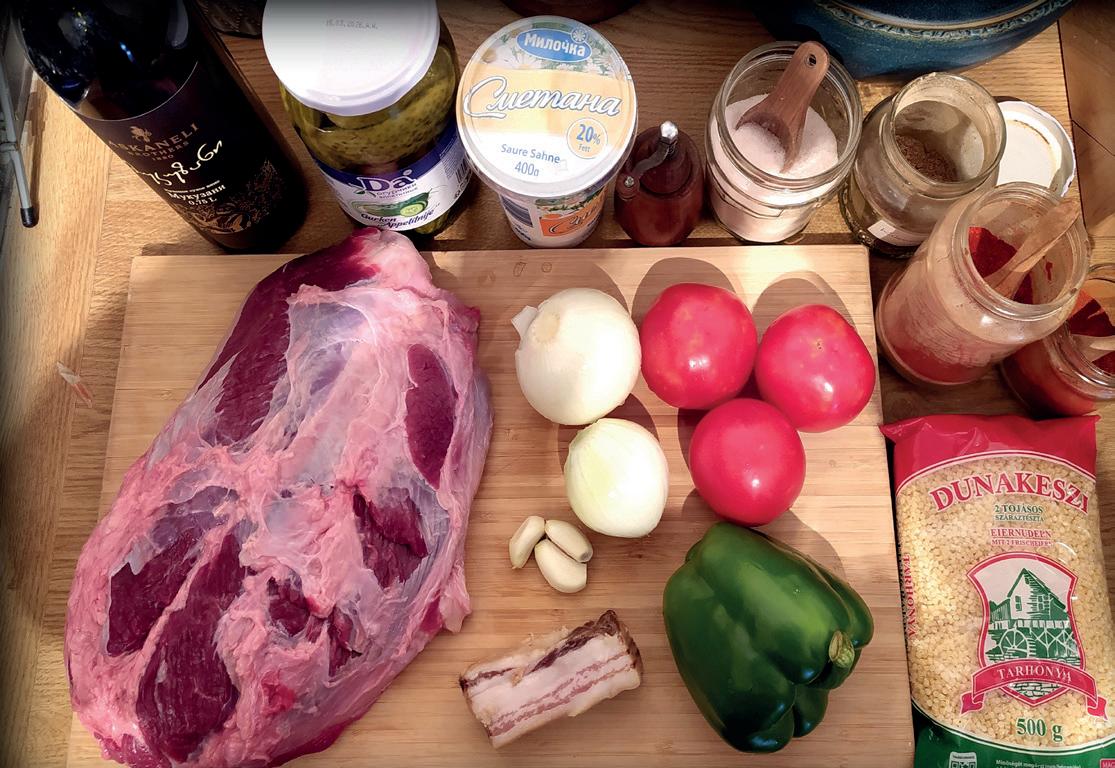

One topic Hungarian people can passionately discuss is how to make the perfect marhapörkölt. While there are many useful tips you can get from professional cooks, grandmothers, and friends, sometimes the best way is to follow your intuition and put your heart and soul in what you do. Here is my version of the famous Hungarian dish.
The two ingredients you should never compromise on are meat and sweet paprika. Try to find a nice piece of beef leg or neck (200-300g per person) that you’ll later cut into big, 3-4 cm sized cubes. You need a lot of (2-3 tbsp or more) Hungarian sweet paprika and 1-2 tsp hot paprika, if you’re a fiery character. Vegetables: 1-2 onions, 2-3 cloves garlic, 2-3 tomatoes, 2-3 green peppers. The ones we use in Hungary are actually yellow and are called white paprika. You can find them in Germany, too. For seasoning I use salt, pepper and 1-2 tsp ground caraway, which is good for digestion. For frying I recommend goose fat or lard. You can use oil if you prefer to but chefs strictly advise against it. Also, I like to pour 200 ml red wine into the stew.
I always like to start with chopping the ingredients: meat, onions, garlic (crush it, not slice it, remember Harry Potter and the Living Death potion), peppers, tomatoes. Now, if you want to be really authentic, you cook the pörkölt on open fire in a typical Hungarian kettle on a tripod (see picture). At home you can just use a large frying pan. First fry the onions in the fat then add the meat and fry it properly until it gets nicely browned and almost all the water from the meat evaporates. (Some professional cooks say the meat should be fried purely in the fat, and the onions separately). Then add the green (yellow, white) peppers, tomatoes and garlic, the seasoning, and just enough water to cover the stew. You can add the sweet paprika at this phase or you can listen to the pros and add
it in the last 20 minutes. I can never wait until the end because I want to see the lovely red color and smell of the paprika in the stew. Similarly, you can add the wine any time you want, but I like to use it for refilling the pan later as the liquid evaporates. Now, after you stirred everything together, reduce the heat and cook the stew for at least two hours. You might need to refill the liquid several times but always use a small amount of water or wine. This slow cooking process with little liquid is the essence of everything that is called pörkölt. At the end you should have dark, glossy, spicy, tender meat in a dark thick sauce.
Another constant discussion point is the side dish. Some pros prefer it solely with fresh bread, but you can serve the pörkölt with all kinds of noodles, e.g. tarhonya (see picture), potatoes, and my favorite one, nokedli, egg dumpling or Spätzle. Finally, top it with sour cream and serve with pickels.

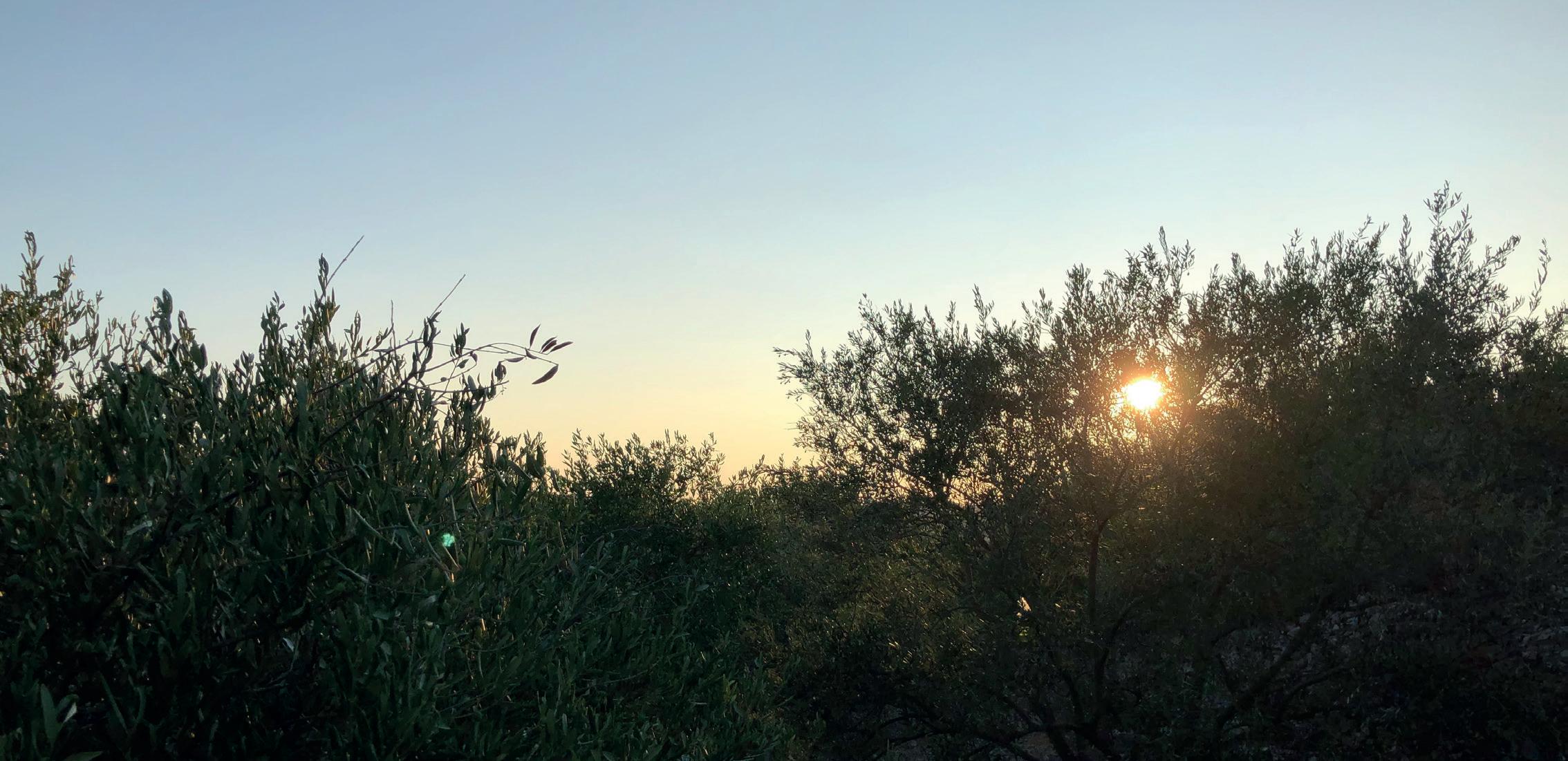
by Stella Maria Klaric
Olives have been able to establish themselves as a major part of the diet, but there is much more to them.
As someone who was born into a family with a long history of growing olives, I was predestined to develop an interest in them. I remember spending my summers in Croatia and always having olives around me - it could be part of my lunch, or just appear in the beautiful scenery when I went to the beach.
Before being able to fully explain what makes these trees so special, I want to offer some more information. Olive trees are native to the Mediterranean basin and can withstand extreme weather conditions. It can usually take anywhere between five to eight years for a tree to grow any kind of fruit. Despite reaching their peak of productivity at the age of fifty, they could potentially produce olives forever. Overall, it is very easy to take care of these trees, and they offer many benefits. The most obvious one would be olives, and
with them, the possibility of making olive oil. The process of making oil is especially interesting as it surprisingly creates no waste product. Even though, the use of olives and their oil has been limited to mainly food and the occasionally skin or hair care treatment, it is undeniably still a major part of everyday life.
The act of planting an olive tree is very special in my opinion seeing as the tree is not planted for oneself, but rather an investment that future generations can benefit from. It is a somewhat selfless act of knowing that all the work that is put into growing an olive tree will pay off, yet the person who devoted most of their time and energy will most likely not get to witness this. However, following generations now bear a certain responsibility for carrying on this legacy. In addition, there is the communal feeling created through caring for these trees and coming together annually to make oil, and even indulging in the fruits of one’s labor at the end of the day.

„Hallooooo“ rings through the historical city centre of Landshut. Medieval music can be heard around every corner and people in peculiar costumes are walking by. The small town in Lower Bavaria is celebrating Landshuter Hochzeit, a historical festival that recreates the wedding of duke George the Rich and Polish princess Hedwig, which took place in 1475. The alliance between George and Hedwig was meant to act as a barrier against the expansion of the Ottoman Empire and was therefore of highest political relevance. Every four years the Landshuter Hochzeit, or ‘LaHo’ as the locals call it, is organised and held by the Förderer association and hundreds of volunteers who slip into the roles of kings, dukes, travelling people, jugglers, and musicians for four weeks.
As Historically Accurate as Possible
The rules for volunteering are strict. You must be living in Landshut and be a member of the Förderer if you want to participate. Your hair also has to be a certain length: at least chestlength for women and around shoulder-length for men. The Förderer take great pride in having the festivities be as historically accurate as possible and a lot of research goes into the costumes and shows. If you take part, you are not allowed to wear glasses, use your phone, or have visible tattoos and piercings while you are in costume. The „noble ladies“ have to take
special stride-classes, while the „knights“ master their swordplay. If you want to apply for a spot as a volunteer, it‘s easiest to get a role as part of a set group, like a band. The roles of the nobles, however, are usually reserved for families who have been with the Förderer for generations.
One of the main attractions is the Sunday parade, where all participants come together to walk through the historical city centre in front of thousands of spectators. It represents the wedding procession of Hedwig and George. This part is very
emotional for the people of Landshut as the scenic view, the ringing of the church bells and the deep connection to their hometown and its traditions fills a lot of people, participants and viewers alike, with pride. Afterwards, it is time for the so-called ‘Lagerleben’, a huge festival area, where you can get medieval food, watch exciting performances or enjoy the medieval music played by the bands. The next LaHo is going to take place in the summer of 2027 – so better mark your calendars if you don’t want to miss out on the vibrancy and ecstasy of Landshut’s beloved LaHo!

You’ve decided to green up your apartment with a new plant, but you don’t know how you’re going to keep it alive? Here’s everything you need to know.
Choose plants based on the light in your room. Is your apartment bright and sunlit or do you only have one small window with little natural light coming in? When shopping for plants, take a look at the sticker on the pot, which will give you information on what kind of light the plant needs.
Some plants are also more forgiving and low maintenance than others. My top picks for beginner plants are:
o ZZ plant (Zamioculcas zamiifolia)
o Spider Plant (Chlorophytum comosum)
o Pothos (Epipremnum)
When you buy plants from the store, the soil they come in is usually of lower quality. Therefore, if you really want your plants to thrive, it’s best to invest in some highquality soil. An alternative to normal potting soil would be plant granulate, which has the added benefit of keeping pests at bay. Some plants, like orchids for example, also require a special soil mix to survive, so it’s good to be informed on what your plant needs.


It’s better to under-water than to over-water your plant. Too much water can cause root rot, which most plants won’t recover from.
A good rule of thumb is to wait until the soil is completely dry, then water again.
It’s also important to look out for a good drainage system. In most cases a pot with holes and a little saucer underneath will work perfectly fine.
House plants are mostly tropical plants that prefer warmer temperatures (around 21-25 degrees Celsius). Extreme changes in temperature can stress the plant, so try to always maintain a stable temperature. The same applies to draughts, which is why plants should be shielded from air currents.
Don’t Be Too Harsh on Yourself!
The last tip is probably the most important one. No one is born with a green thumb and even the biggest plant lovers (like myself) have killed one or two (or several) plants in their life!
My biggest advice is to analyse your mistakes and to learn from them - and sometimes to blame the plant for not having enough willpower to thrive in its environment. All jokes aside, there are many online resources that can help you find out what’s best for your particular plant.
I’ve added a short list of sites that I find worth checking out.

Being called passion fruit brings a certain expectation with the name - something you feel obligated to achieve, some sort of criteria you have to ful ll to live up to your name. Maybe coming from a place that is known for its passion, having exciting and dangerous journeys around the world or being used in exotic drinks or meals. So, let’s see if a passionfruit lives up to its name.
Firstly, the place of origin seems to check the rst box. Having been introduced to Europeans during their global travels and colonization of South America, it got its name from Spanish Christian Conquistadors who saw similarities between the fruit and the passion of Christ. Calling it “ ower of the ve wounds“ they used the fruit to tell the story of Christ to the indigenous people. The name was later translated into English as ‘passion fruit’ or ‘ ve wounds passion fruit’. Another word for it is Maracujá derived from a Tupi Guarani language which was spoken in parts of Brazil. So, after being “discovered“ by the Old World in the 16th century, it is still grown in South America today, speci cally in Brazil, Paraguay, and Northern Argentina. And following the lines of stereotypes of those countries, a passion fruit seems to t in well with the ery carnival in Rio de Janeiro or the chants in Argentine football stadiums. So, concerning a passionate place of origin the passion
fruit seems to have chosen the perfect home.
Next on the list is journey or mode of transport. During the colonial era, transportation was entirely different: crossing the ocean by sailing was a dangerous affair. No wind in the sails, a heavy storm or sickness
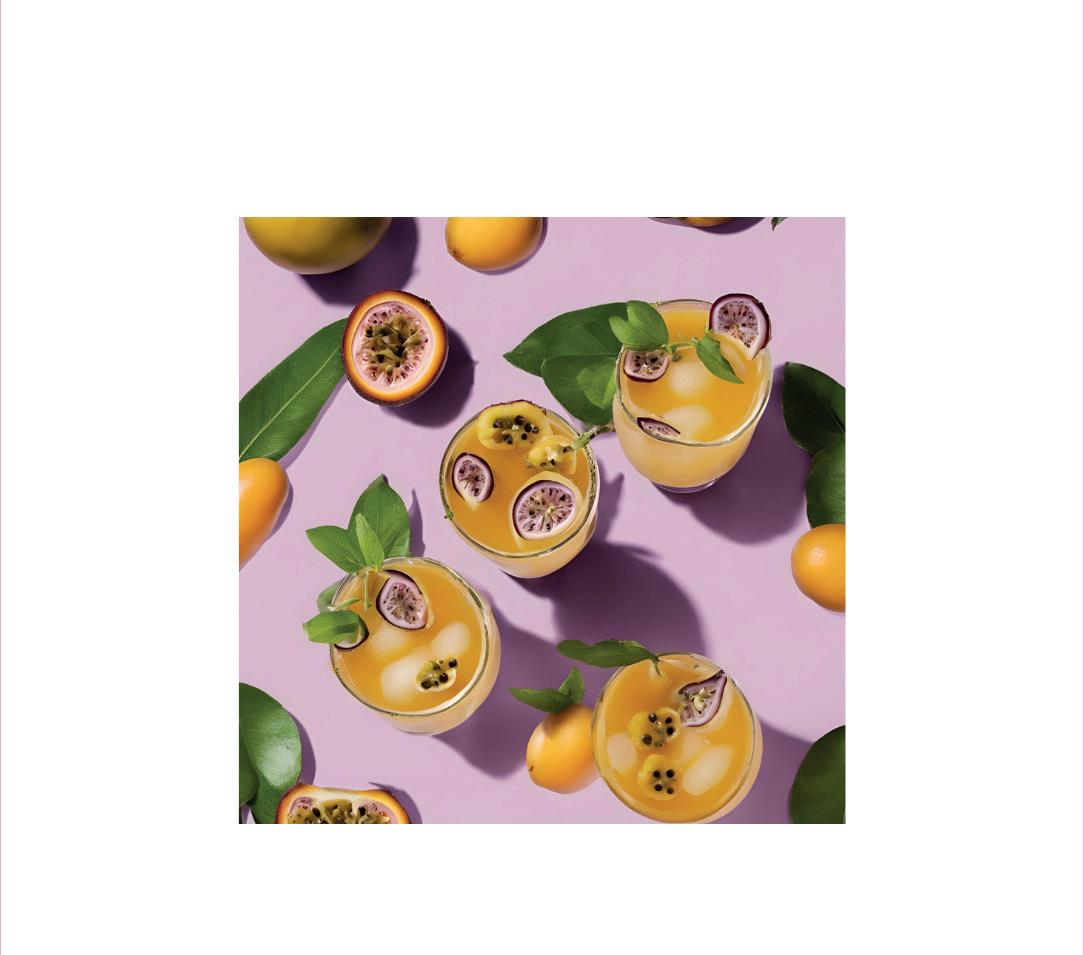
could easily decimate a ship’s crew. Therefore, getting a passion fruit to Europe during the 16th century right up to the invention and usage of steam ships, it was closely linked with passion: passion to survive and get home safely. Nowadaysneedless to say, de nitely less eventful. After being harvested from plantations, they are put on transporters to be brought to harbors on the coasts. From there they are loaded on big containerships to be distributed around the world. This part is rather unspectacular today but bearing the former struggles in mind we will give it half a point.
International food star
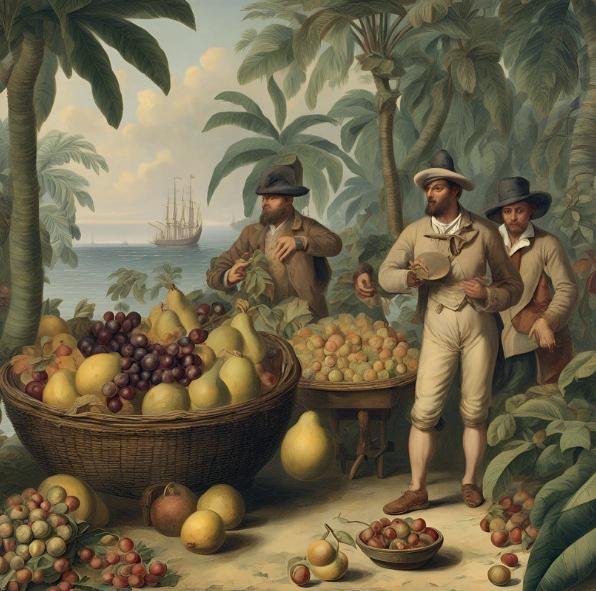
Lastly, a passionate destination or thenal purpose of our fruit. Being an international food star, passion fruits end up in all sorts of places: A fancy restaurant or a late-night cocktail in a mysterious bar are the more high-end places it can nd its new home. However, the passion fruit does not only visits glamorous places: Being pressed down to become a nice juice or ending up at a family dinner are also on the table. So, there are many ways a passion fruit can nd its meaningful end and by that, tick its last box and ful ll its general purpose.

Passion fruit is a multifaceted fruit: it is exotic, refreshing, and a hidden gem to many people. With summer approaching and the days becoming warmer, there is no better time to prepare this invigorating passion fruit tart
Since they are rather small, you will need several passion fruits for this recipe, which can be quite expensive. After foraging through numerous supermarkets, I discovered that you can buy passion fruit for just €0,87 apiece at ALDI-Süd.
As the crème and curd add sweetness to the tart, we use an unsweetened tart base.
Ingredients:
• 225g flour
• Pinch of salt
• 100g cold butter
• 125g mascarpone
1. Mix salt and flour and add the butter. Rub in until you have a crumbly mixture
2. Add the mascarpone and knead again. Flatten and refrigerate for at least 30 minutes.
Note: The dough must not get too warm, otherwise the butter will melt, and the tart could break after baking.
3. Butter your cake tin (24 cm) and dust it with flour to prevent sticking. Roll out the dough to a height of about 3 cm, prick it with a fork, and refrigerate again for 15 minutes.
4. Preheat the oven to 200°C. Place baking paper on top of the cake and weigh down the center with dried pulses to prevent it from rising.
5. Bake for 20 minutes in the lower half of the oven. Remove baking paper and pulses. Bake for another 20 minutes until done.
Optional: You could consider adding a bit of sugar or another sweetener of your choice to the base.
While the tart is cooling down, prepare the quark crème.
Ingredients:
• 200g cream quark
• 125g mascarpone
• 2½ tbsp of powdered sugar
1. Mix cream quark, mascarpone, and powdered sugar.
2. Spread the crème on top of your cooled tart.
For the finishing touch, prepare the passionfruit curd.
Ingredients:
• 8 passion fruits
• 190ml orange juice
• 3 fresh egg yolks
• 75g sugar
• 2 ½ tbsp flour
• 40g melted butter
1. Split the passion fruits and sieve the pulp to collect the juice, reserving the seeds.
2. Stir the juice and all remaining ingredients with a whisk.
3. Bring mixture to a boil over medium heat, stirring constantly. Once thickened, immediately remove the pot from the heat and continue stirring for about 2 minutes.
4. Pour the curd through a sieve into a bowl, stir in the reserved passionfruit seeds, and let it cool.
5. Put the curd on top of the tart and refrigerate again.
Now your perfect Passion Fruit Tart is ready to impress!
Serve and Enjoy!
PS: To fully capture the summer feeling, enjoy this tart with a cold Aperol Spritz.
by Carlo


1. vehicle many Germans are passionate about
2. single stranded DNA structure
3. you either love them or hate them
4. becomes weaker in strength
5. Iceland on a map of Europe
6. a lifestyle many people aspire but activists hate
7. sandwich named after it’s ingredients
8. feline zodiac sign
10. sticking together
11. part of infinitives
12. not illegitimate
14. Sci-Fi space franchise
17. something or someone that scrubs
19. evidence
20. English Graduate Student Association, abbreviated
23. great with some avocado and number 44 in some guacamole
24. English inventor and father of the electric motor, last name
26. Great Britain, Ireland and the Islands surrounding them, for short (two words)
27. online exchange platform
31. Texan stew with beans and tomatoes
32. give an _ and a leg, metaphorically
33. it sets your pants on fire in English and has short legs in German
35. Virginia Woolf’s sister who often illustrated her works, first name
36. hospital test, abbreviated
37. thankful gesture, while texting
40. Central American country bordering Nicaragua and Guatemala, abbreviated
41. what a ghost might say
43. preposition, sounds like a river in Bavaria
Across:
1. colour, when all primaries are mixed together
6. speaker brand
9. your partner’s parent
11. old-timey message and modern messaging app
13. Abel’s brother
15. Bismarck’s first name
16. armless clothing item
18. the one that got away
21. “Left _ ? I don’t remember the way.” (two words)
22. alien calling home
24. Japanese floor beds
25. “I’m better than you”
27. fail
28. a Great Barrier in Australia
29. Noah’s vessel
30. a hunk
31. west-coast US state, for short
34. rays coming from the sun
36. holiday with red and green themed decorations
38. just at the right time
39. burnt wood or a Pokémon trainer
42. grease made from peanuts, almonds or cashews
44. tear jerking root vegetable

A: Romanticized toxicity - the main character falling for the walking red flag, for literally no reason?!
B: The talentless underdog achieving just anything with only willpower and effort - won‘t make my life less miserable lol.
C: The Time Travel Plotline being a never-ending cycle, because destiny apparently always prevails.
D: The overly virtious, always nice goody-two-shoes main character - UUUGH!
A: Time Travel - I have too many regrets...
B: Mind Reading - Life would be so much easier!
C: Flashy, Fancy, and Fast: Telekinesis!
D: Mind Control to get what I want, when needed.
A: Thinking fast, you immediately call the police and watch out for suspicious behavior.
B: You can‘t be bothered and don‘t want to get involved, so you just yeet yourself out of course.
C: As the intelligent hobby detective you are, you analyze every detail. What could have been the motive of the murderer?
D: You are holding back your laughter because it is a prank. There is no blood, just ketchup!
A: The smartest 10-year-old.
B: The God of Death only you can see.
C: A legend, an icon, an unbothered queen.
D: A weirdly charismatic Con-Artist.
Bonus: Looks are important, check out your assistant!


“Anime is for Kids“ is known as one of the most common prejudices towards the medium that hinder from giving it a chance. Still, there is a reason why it connects and fascinates millions of people all over the world. Let me prove to you how there is a fitting anime for every taste! Find out for yourself. Which Anime suits you best?
A: 250g Psychological Thriller, 100g Mind Games, one pinch of Philosophy.
B: Emotional Damage, Deep Life Lessons, and 3 tablespoons Mystery.
C: Coming of Age, Slice of Life, and one glass of Slow-Burn Romance!
D: I want a bit of everything hAhA. *laughing in chaotically indecisive manner*

A: Sadly, Suppressing Emotions.
B: Overthinking!?!?!
C: Superiority Complex, but nobody knows.
D: I don‘t! Actually, maybe I do. Miscommunication.

A: Are hyperactive and do everything else than actually watching.
B: Like to get completely immersed and block out your surroundings.
C: Make yourself a cozy place and peacefully eat ice cream.
D: Secretly wipe away your tears with tissues you have prepared beforehand.
A: If everyone is not special, maybe you can be what you want to be!
B: When you talk sincerely, you always get your feelings across.
C: I‘ll take a potato chip AND EAT IT!
D: I want to go to a faraway island, an island that has no people.



A: Villager, because it is more exciting to know nothing and just let the drama unfold.
B: Seer - Big Brother Is Watching You.
C: Werewolf. If you annoy me, you get killed.
D: We are lost without me: Medic.


Flip the page upside down, gather from the answer key which number each of your A/B/C/D responses correspond to and find out which anime to watch depending on your most picked number!

tions: eTh Promised Neverland & Orange
touching anime will keep you warm even in winter. On top of that, you appreciate an interesting time travel plotline and a little bit of mystery sprinkled in between? enTh Erased is your match made in heaven! Honorable Men-
make you cry and heal your inner child in a way you didn’t know you needed. isTh is nothing new to you, because you enjoy being emotionally connected to the characters. isTh
Prepare your tissues, because this show will
4 Erased {12 ep./dub}
Ao Haru Ride & Skip To Loafer
Honorable Mentions:
You want to experience this warm, fuzzy feeling and the wide smile that uncontrollably sneaks up on your face! ereTh is enough toxicity in media, so you enjoy a healthy portrayal of friendship and love.with a realistic main character you can identify with. A feel-good anime, that takes you back to your nostalgic youth is what you need? enTh you should not miss Kimi Ni Todoke.
3 Kimi Ni Todoke {38 ep./sub}
Monster & Psycho Pass
Honorable Mentions:
mind games and complex crimes. You are sick of shallow plot twists and incompetent police. What you need is a masterpiece, because you are a critical watcher and detailorientated. A gripping story, a morally grey and highly intelligent protagonist with a worthy opponent, philosophical questions that will keep you thinking, and unpredictable twists: Death Note has it all and you won’t be able to put it down!
As a true crime fan, you can’t get enough of
2 Death Note {37 ep./dub}
Monster & Psycho Pass
Honorable Mentions:
Psycho 100 is the best pick for you! Buckle up, it’s a wild ride!
You have a wide range of interests and are not picky about your show. As an open-minded watcher, you like to get out of your comfort zone and are not afraid of a crazy mixture of various genres and elements. Brownie Points, when the humor is on point! at’sTh why Mob
1 Mob Psycho 100 {37 ep./dub}
Example: Your answer key combination is 1113241321, then 1 is your most picked number.
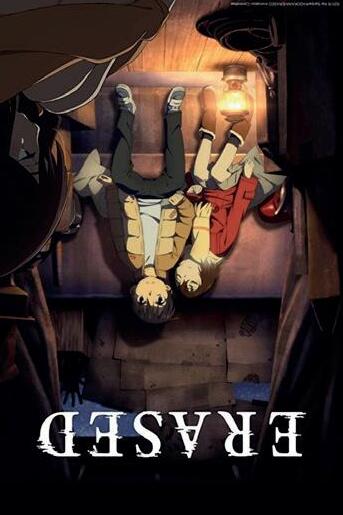

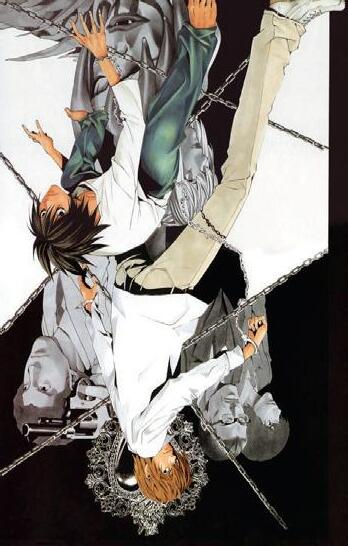


1
by Robin Zimmermann
I was born in Belgium and am known for my strength, leadership and tactical awareness.
Before moving to England, where I spent most of my career, I spent two years in Germany.
I captained my team to multiple Premier League titles, FA Cups, and League Cups but never managed to win the most infamous trophy in club football.
I scored a memorable long-range goal in the 2018-19 season that was crucial in securing the Premier League title for my team.
After returning from England, I shifted my focus onto a managerial career starting out as a player-manager and later becoming a full- time manager.
Last but not least, I have just been appointed by one of the biggest clubs in Europe.
3
I am a legendary soccer player whose nickname is a resemblance of my elegant playing style and leadership.
I spent the majority of my career with one club which has now honored me with a statue in front of the stadium.
I also had successful stints in the United States of America playing alongside one of the greatest Brazilian players ever.
I revolutionized the role of the Libero and was instrumental in leading my country to two World Cup victories as both a player and a manager.
After retiring as a player, I had a distinguished career in management and administration, becoming an influential figure in world football

2
I am a Spanish midfielder and captain known for my vision, passing and leadership on the field.
I have been a crucial part of the Spanish national team, representing my country in major tournaments.
I play for one of the biggest clubs in Spain and have won multiple league titles, Copa de la Reina trophies and the UEFA Champions League
I was named the Best FIFA Player and won the Ballon d’Or for my outstanding performances.
Throughout my career I have always been battling with injuries.
I am celebrated not only for my skill and success but also for being a trailblazer and role model in my world of football.
4
I started my career playing as a center-back before becoming a striker, who is renowned for exceptional goal-scoring ability and positioning.
I began my professional career in my home country before moving abroad and winning two back-to-back league titles and reaching a Champions League final.
One year later I transferred to the team which I had lost to in the Champions League Final and ended up breaking numerous records, including the most goals in a single league season.
I won the FIFA Best Player award and have been a consistent top scorer throughout my career, which led me to ultimately winning the Champions League.
I have represented my country in multiple European Championships and World Cups, which led me to becoming my country’s all-time leading goal scorer.
Solutions for the quiz can be found on the last page of the magazine!
Although passion is an individual feeling and differs from person to person, there are some people on this planet who embody it like no other.

Passion can be defined as a sense of desire to keep going until you achieve the ultimate goal. It is a feeling which makes you believe that even the biggest obstacles can be overcome.
On the 23rd of January in 1984 a little boy was born, who would go on to be driven by a fire, which would not only allow him to overcome severe setbacks but also lead to him achieving his ultimate dream.
by Robin Zimmermann

From a young age it was evident that this young boy had a very specific talent. In order for him to live out this talent, he only required one thing - a soccer ball. When he started out his career at his boyhood club in the Netherlands, it was apparent that even though he was never the most talented, he was always the most passionate. After working his way through the youth ranks, he moved to PSV Eindhoven, one of the biggest clubs in his home country, before moving abroad to FC Chelsea, one of England‘s most popular clubs, and then to Real Madrid, the biggest club in the world. It was at the last club where the obstacles started to arise. These not only included recurring injuries but also him being framed as an egotistical player who only cared about himself and shied away in the moments when it really mattered. This ultimately led to him having to leave the biggest club in the world and arguably having to take a step down on the ladder of football clubs.
When he arrived at his new clubs, he brought the obstacles with him. He kept being framed as being an egotistical and injury- prone player who only sometimes showed what he was actually capable of. These negative feelings towards him as a person peaked in the year 2012, when he would play
a contributing factor in his team not only losing out on the national championship but also missing a penalty in the Champions League final, which led to his team finishing the season trophyless. Throughout his whole career it was not only his talent but also - and especially - his passion and desire to keep going that separated him from other players. The following year he would go on to have the best year of his career, being the decisive player when it mattered: a team player and the one scoring the most important goal in the Champions League final in 2013.
He never gave up, he decided to keep going. Arjen Robben, the embodiment of passion and the legend of FC Bayern Munich.


The Delft Mercurians are set to compete in a robotics football competition, using 6 centrally controlled robots to face off against other teams, and score as many goals as possible. But how did they get there and what keeps them going?
It is October 2022 and Thomas, a student at the Delft University of Technology in the Netherlands, is holding a presentation at the Robotics Student Association. His plan: to attract members to form a team that will compete in the annual RoboCup. Little does he know that in two years his team, the Delft Mercurians, will have grown to include 21 members and qualify to compete in the 2024 RoboCup in Eindhoven.
Now, you may ask: what is this RoboCup? Steven, the Delft Mercurians’ team manager, refers to the robotics football
competition as follows, “I would describe it as the Robot Olympics, with focus on innovation, research and sharing knowledge. All teams are encouraged, and sometimes obligated, to make their designs open source. This makes the competition interesting and accessible for more competitors and the audience.” According to Steven, to tackle this daunting challenge, the team must be very disciplined. “We all have specific roles, which were mostly determined by the members’ interests,” he says. “We need to build the robot from the ground up, so all the mechanical, electrical, control and software aspects need to work,” he explains. Because all the team’s members are or have at some point been enrolled at the Delft TU, every Delft Mercurian has at least some background in the art of robotics. On the question of important skills necessary for their craft, Steven lists “CAD design, general mechanical assembly, circuit/PCB design and testing,
by Janina Hettasch
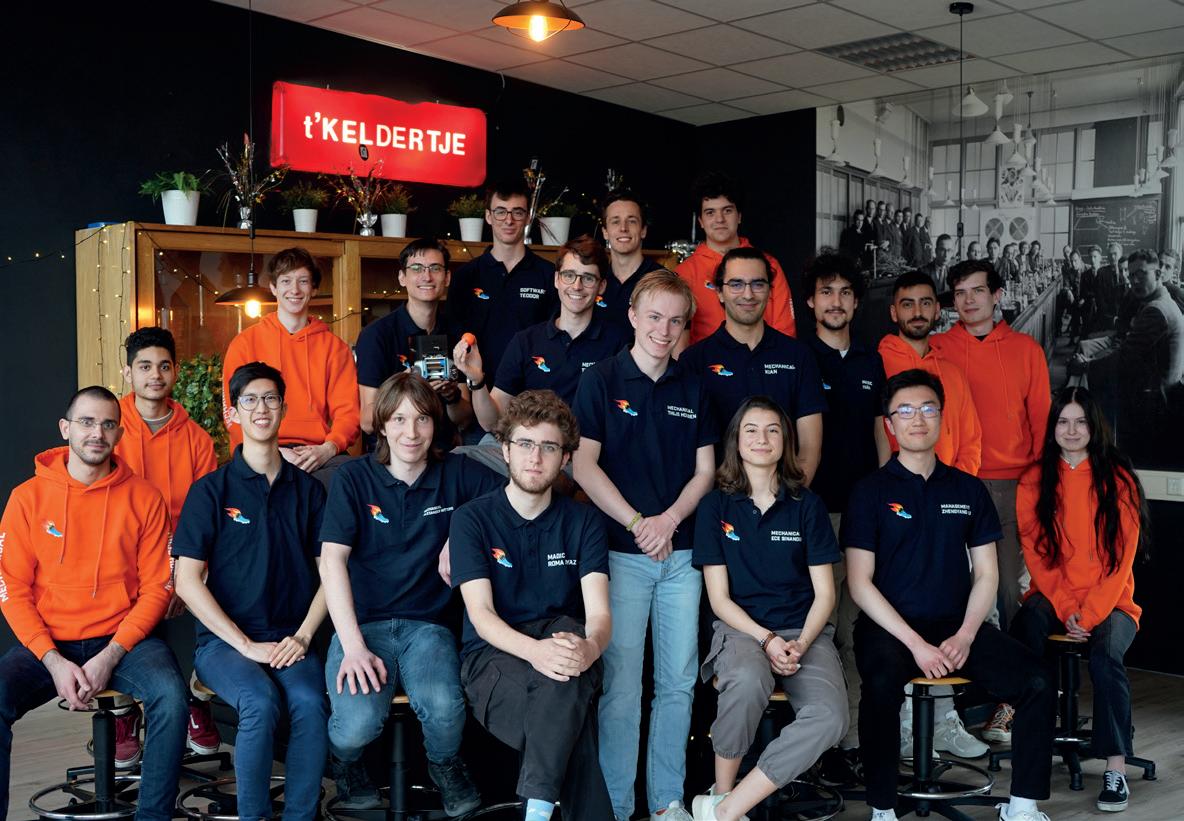
soldering and both high-level and low-level programming.”
The matter and the mind
Given the high cost associated with building and programming robots, the team heavily relies on sponsors, including the university itself. Their head-office, located in Delft’s RoboHouse, is the place where all the magic happens. This is also where they received some of their equipment from. Steven explains that “for most of the robot we do 3D-printing using PLA (polylactic acid). For the base plates, to mount some of our components, we use laser-cut wood pieces. And for some other parts we use metal and silicon.”
Clearly, this is no simple hobby and requires a lot of dedication and personal commitment. Steven mentions how important it is for each team member to be excited about what they are doing, but also that it is the founder Thomas’s passion “which drives the team”. All the Delft Mercurians harbour great enthusiasm for robotics, believe in the importance of sharing one’s passion and doing community outreach. As Steven puts it, this “can feel rewarding and helps you move forward.” He recommends “having friends to share progress with, scratch heads together while solving problems and get excited over the little things,” in order to not burn out. The Delft Mercurians serve as an example to all those dreaming of following their passion and how just one person’s passion can become the cornerstone of something so much bigger.
Once upon a time in the vibrant world of music, a band emerged with a name that evokes the beauty of flowers and the sharpness of thorns. A quartet, formed from the remaining seeds of a musical group called Windfall and not afraid to go against the values of a highly codified genre - favouring authentic musical expression over the typical dance routines associated with their world. All beginnings are small: the four started by busking on the streets, playing to anyone who would pass by and slowly building their fanbase from the ground up.
It was only in 2020 that the musicians dropped the bombshell that they were suing their agency for mismanagement and not paying them properly, which eventually led to their freedom and the forming of their own label. Imagine the drama of fighting for your creative freedom… and winning! Luckily, the band did not fall apart. Their fans Black Roses have propelled the band to festival performances at Lollapalooza Chicago or Brazil and the Montreux Jazz Festival, on top of getting a support slot opening for a major act at BST Hyde Park. Talk about global reach!
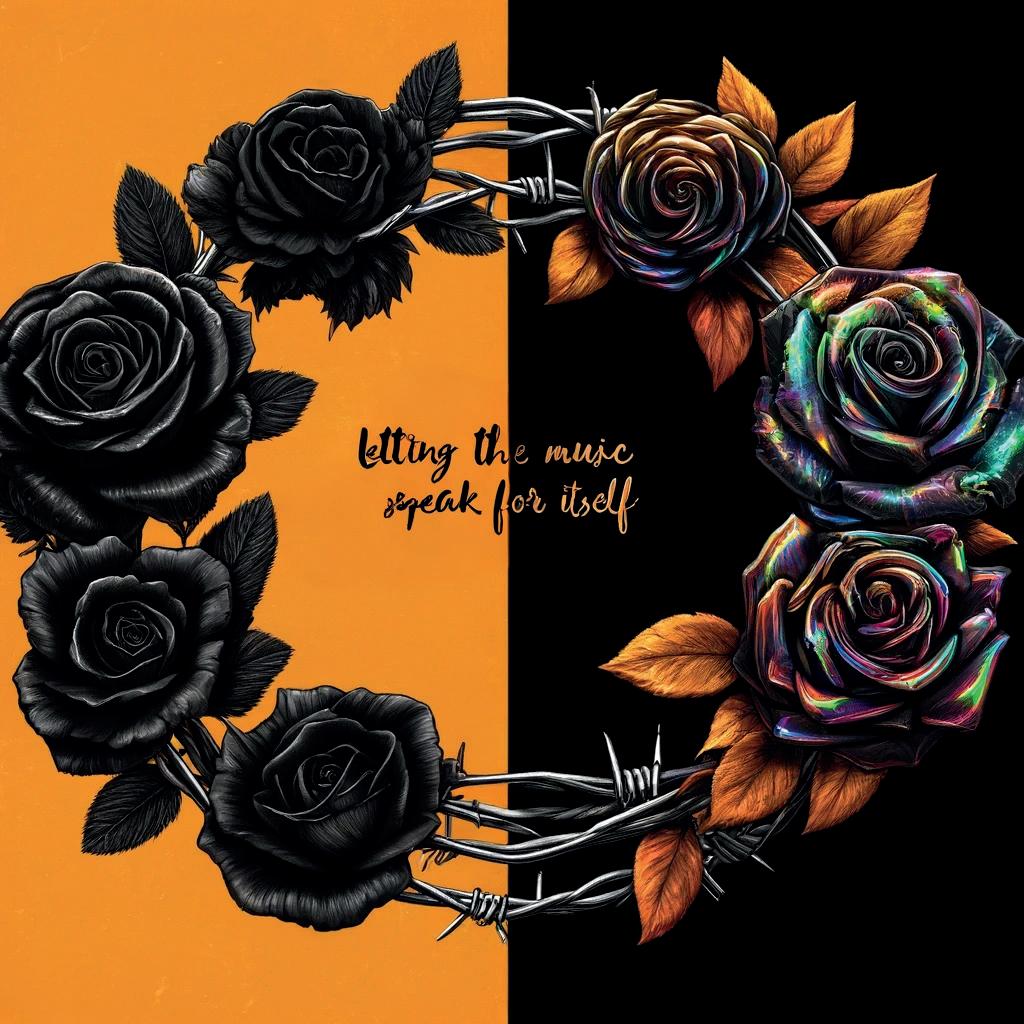
The band‘s music is a blend of genres, reflecting their varied influences and commitment to authenticity. And while all these musical and stylistic influences are evident in their works, their new album Dual has been described as a sonic exploration of ‘duality’, split into two sections – Dusk and Dawn –which represent different musical and emotional themes The lead vocalist and guitarist, recognized for his unique style known as „cursive singing“, has also pursued a solo career. Besides constantly working on music with the other members, he’s ventured out solo with the projects such as the EP Moth – written and produced by the artist himselfand its title track Phase Me.
The close-knit relationship with their fans is a cornerstone of their success. In an interview, Sammy - lead vocalist and guitarist – humourlessly noted that people in their home country did not know them that well. This reflects the band‘s unique position as an indie rock band with a significant global following. So, who is this genre-defying, fandom-friendly band? The one that not only survived legal battles but also performed successfully on stages across the world, all the while staying true to their artistic vision. They‘re proof that music endures.
by Andrew O‘Gorman
“I have no special talent. I am just passionately curious.” – Albert Einstein.
As we enter the 11th edition of this magazine, it is safe to say that it has quite a history already. And with this trivia quiz, you can test and prove your knowledge (or prove today is your lucky day by guessing correctly). Will you be an expert of LMU journalism, or is it time for you to be passionately curious about the magazine?
1: When was the first edition of the magazine created?
a) Summer Semester 2019
b) Summer Semester 2018
c) Winter Semester 2019
d) Winter Semester 2017
2: Who was the first editor-inchief?
a) Vivienne Arnold
b) Helen Walker
c) Jessica Bacon
3: Who is the current editor-inchief?
a) Alan Coss
b) Nicholas Jacob-Flynn
c) Joe Genlloud
4: Which edition had the most pages at 63?
a) 6th edition
b) 11th edition
c) 10th edition
d) 4th edition
5: What was the theme of the 8th edition?
a) Hope
b) Happiness
c) Pride
d) Future



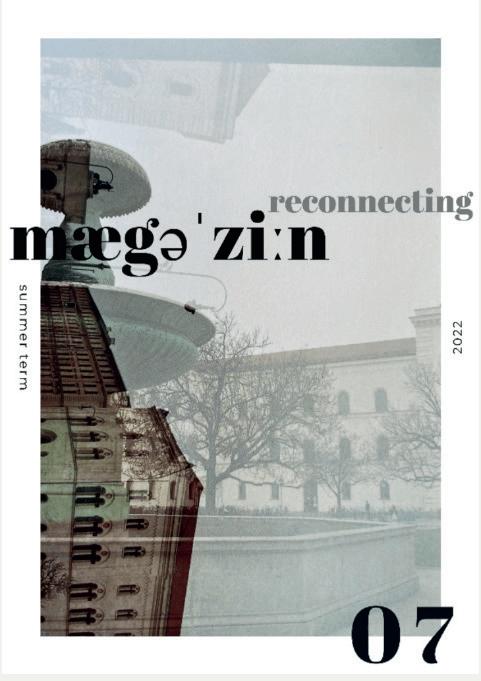
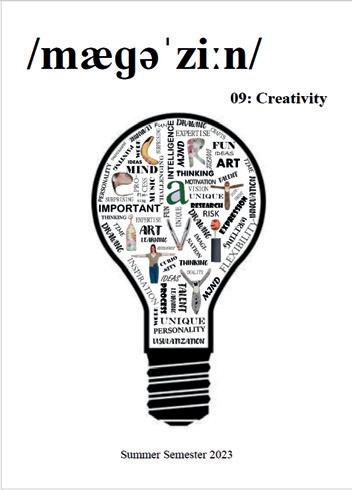
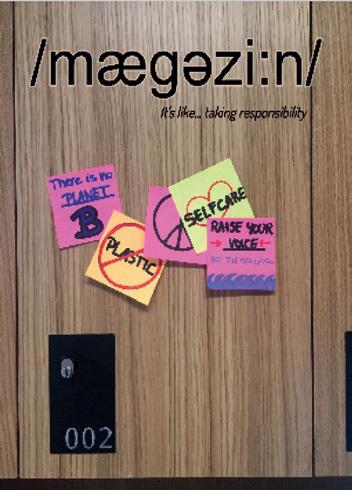

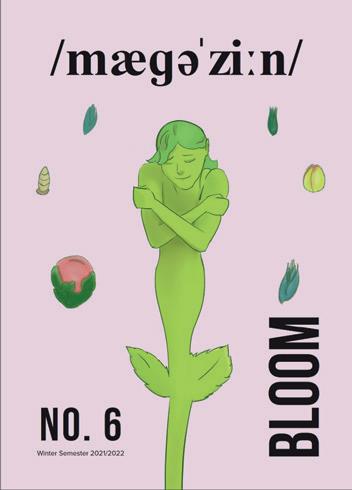
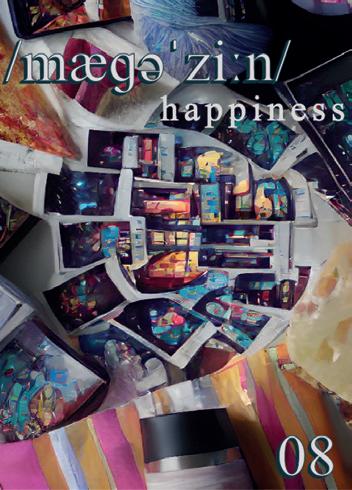
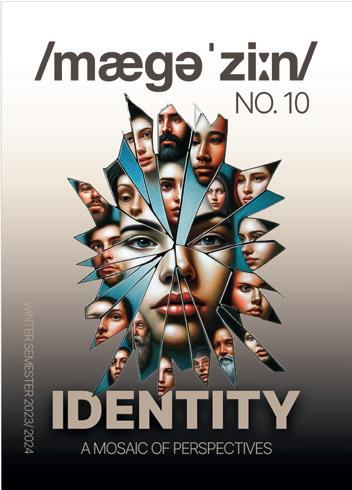
6: What is the correct phonetic transcription for “magazine”?
a) /ˌmӕɡəˈziːn/
b) /ˌmӕɡəˈzɪn/
c) /ˌmeɡəˈziːn/
d) /ˌməɡəˈziːn/
7: What company prints the magazine?
a) AufDenLetztenDrucker
b) Donald DRUCK
c) WIRmachenDRUCK
How many answers did you get correct?
7: ”magazine“ expert!
6-5: You know more than most of us
4: More than 50% - That’s enough to pass most tests!
3: Less than 50% - Well…close, but not close enough
2-1: Practise makes perfect (Or maybe reading all the magazines does?)
0: “The biggest room in the world is room for improvement“ – Helmut Schmidt
Whether you are an expert in knowledge on the magazine, simply a good guesser or unfortunately unable to answer the questions really isn’t the important thing to us. We are truly thankful for every reader, whether this is the 11th straight edition you bought or the first time you found us (or even if you just happened to stumble across it while looking at the cakes).
Crossword p.33:
“The
nice thing about doing a crossword puzzle is, you know there is a solution” - Stephen Sondheim

Soccer quiz p.36:
1. Vincent Kompany
2. Alexis Putellas
3. Franz Beckenbauer
4. Robert Lewandowski
Magazine quiz p.41:
1.A; 2.A; 3.B; 4.D; 5.B; 6.A; 7.C
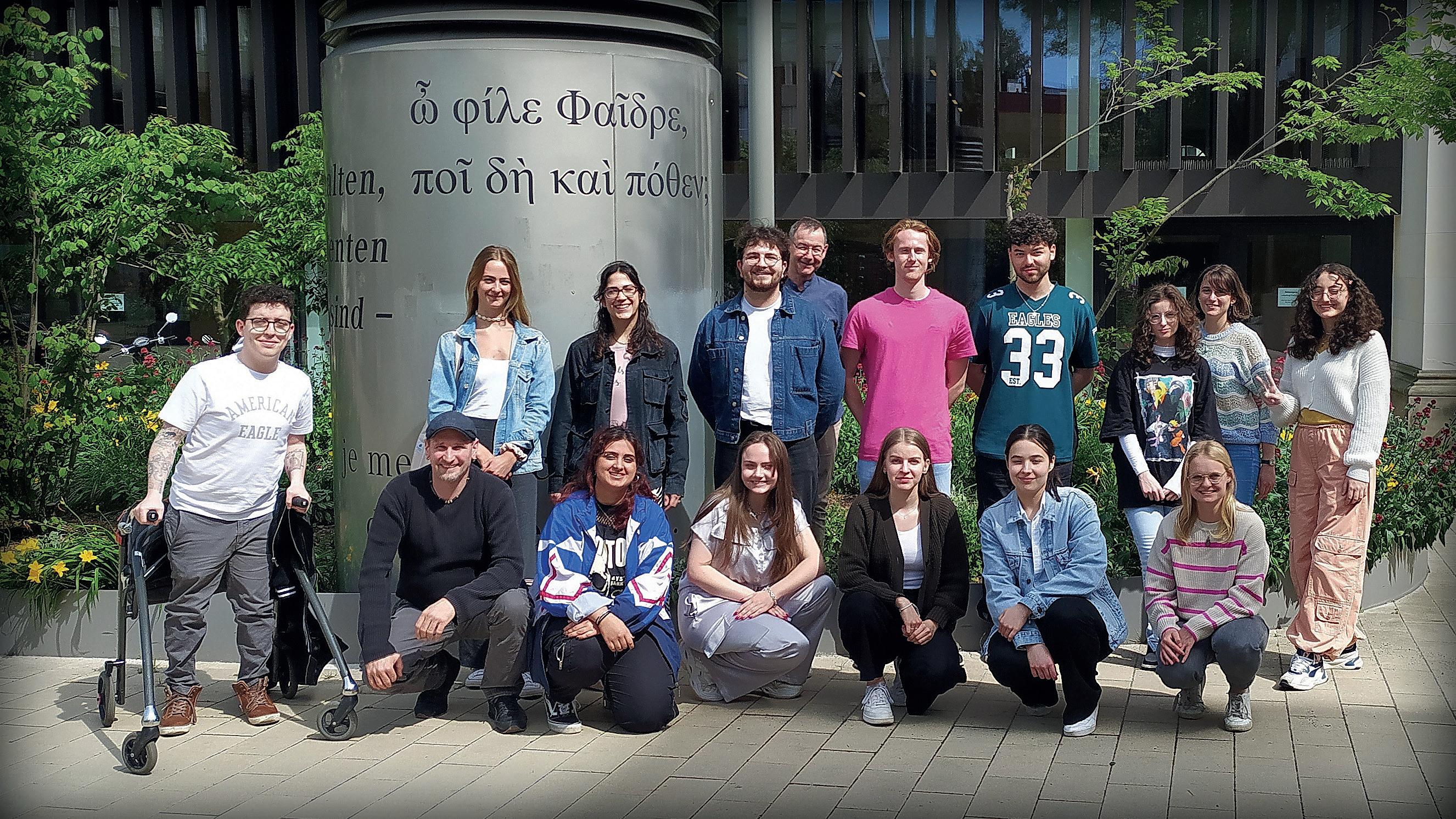
Welcome to the eleventh edition of the English Department Writing Skills 2 course /mægə‘zi:n/ . It has been highly rewarding working with such a great group of students who are passionate about so many different things in many different ways – as you will see when you read the array of articles here.
A big “thank you” to everybody who has contributed to this “Passion” project, including the organisers, bakers and sellers of cakes (without which there would be no magazine) and special thanks to editors Aanya and Carlo for putting the whole thing together, to Janina for the photos and cover artwork, and to Andrew in particular for the fantastic layout and all the time and work that has involved.
If you have any questions, comments or want information about how to join for the twelfth edition (WS 2024/25), please contact me: Nick Jacob-Flynn: jacobflynn@lmu.de
We would like to thank AnglumniLMU for their support and generosity in funding us. Thank you also to the Department of English and American Studies at the LMU.
Printed by: WIRmachenDRUCK GmbH Mühlbachstr. 7
71522 Backnang
Deutschland
www.wir-machen-druck.de
Copyright Information p. 4-5 Pixabay.com; p. 6-7 Pixabay.com; p. 8 Canva, AI-generated; p.9 Aanya Sethi; p. 10 Microsoft Copilot, AI-generated; p. 11 Pixabay.com; p.12 Attila Topolczai; p.13 Janina Hettasch; p.14-15 Pixabay.com, Sibylle Zakel; p.16 Pixabay.com; p.17 Yazed Aljohanii, Ramin Nazar, Bartos Gyorgy; p. 18-19 Dr Lianna Mark; p. 20-21 Pixabay.com; p.22 Parfumo.de; p. 24 Istockphoto.com; p. 26-27 Attila Tapolczai; p. 28 Stella Maria Klaric; p. 29 Fiona Liebl; p. 30 Pexels.com; p. 31 Canva, AI-generated; p. 32 Lisa-Marie Festner; p. 34-35 Studio Bones/ONE, Takeshi Obata, Production I.G. Studios/Karuho Shiina, Picture Studios/Kei Sanbe; p. 36 en.ac-illust.com; p. 38-39 Delft Mercurians; p. 40 AI-generated; p. 41 previous editions
“I would rather die of passion than of boredom .” — Van Gogh
"By the time you swear you're his, shivering and sighing, and he vows his passion is infinite, undying -- Lady, make a note of this: One of you is lying.”
“Nothing great in the world has ever been accomplished without passion.“
- G. W. F. Hegel

"Nothing is as important as passion. No matter what you want to do with your life, be passionate." - Jon Bon Jovi
-Dorothy Parker
“No alarm clock needed. My passion wakes me.” - Eric Thomas
"Once more with feeling"
"Why else are we here if not to live with unreasonable passion for things" - butterfly rising
“No matter what you aspire to, you've got to love what you do in order to be successful at it."
- Michelle Obama
“Live to the point of tears.”
- Albert Camus
“Create
the life you can’t wait to wake up to.”
"My mission in life is not merely to survive, but to thrive; and to do so with some pasion, some compassion, some humor, and some style."
"Passion is the path to meaning"